 |
|||||||||




 |
|||||||||





Photo: Two mascot statues unveiled at the Tokyo Metropolitan Government headquarters for the 100 days to go until Tokyo 2020. Credit: © Tokyo 2020 and TMG. Image provided by IOC.
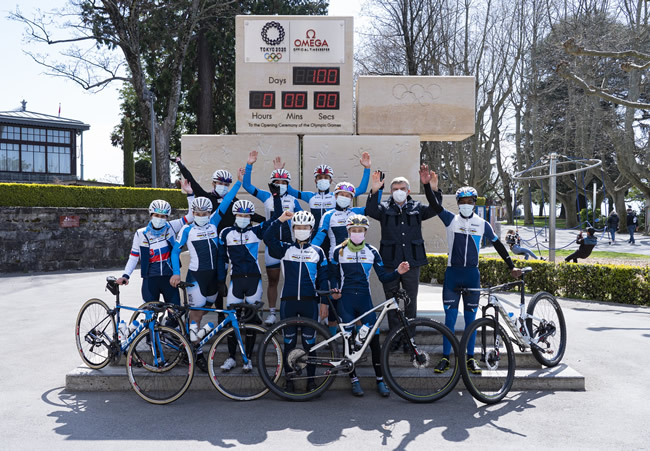
Photo: IOC President Thomas Bach visits the countdown clock with 100 days to go before the start of the Tokyo Olympic Games 2020. Image provided by & Credit: © 2021 - IOC/Greg Martin.
Tokyo, 09 Jul 2021 — While spectators may not be able to attend Tokyo 2020 in person, fans worldwide and in Japan will be able to experience the thrill of the Olympic and Paralympic Games Tokyo 2020, thanks to new, innovative technologies. Tokyo 2020 will be broadcast globally to a potential audience of over 5 billion people, with more coverage by broadcast partners than any previous Olympic Games across both linear TV and digital:
In Japan, TV coverage of Tokyo-2020 could be around double that of Rio 2016.
NBCUniversal will air more than 7,000 hours of coverage across TV and digital platforms in the USA - a US Olympic record.
Across Europe, Discovery Eurosport will air up to 4,000 hours of coverage on its TV and digital platform. This unprecedented level of content will be available in 48 territories.
The International Olympic Committee (IOC) and Olympic Broadcasting Services (OBS), working with the Tokyo 2020 Organising Committee and Olympic broadcast partners (RHBs), have also created a suite of digital tools as part of the “ Share the Passion” project. It will allow athletes to engage with friends and family in the venues and enable fans worldwide to be actively involved in supporting their sporting heroes.
Fan Video Matrix: Allows fans to be a genuine part of the Games experience by sharing their reactions to the sporting action in five-second video selfies, displayed as a video matrix inside the venue.
Cheer Map: A virtual “cheer” button will get embedded on several broadcasters’ digital platforms. Fans can watch the broadcast feed of an Olympic event and virtually clap or cheer by clicking the button. The system collects all the cheers and renders a global map of “ cheer activity.” The map is sent as a video stream to broadcasters and showcased on venue video boards.
Athlete Moment - Family & Friends: At selected venues, Olympians will be able to interact live, straight after they compete, with their family and friends back home through dedicated “ Athlete Moment” stations.
“ Our ambition is to bring the magic of the athletes’ achievements to the world on an unprecedented scale. Technology will play a critical role and allow us to bring fans ‘ inside the venue’ virtually. It is an important ambition, not just for the fans but also for the athletes as they compete on the world’s biggest stage. The IOC and OBS have benefited from the great partnerships we have with the world’s leading media companies and sponsors and with Tokyo 2020. We also believe these new digital innovations will leave a legacy which we will build on at future editions of the Olympic Games,” says OBS CEO Yiannis Exarchos.
For Tokyo 2020, OBS will again push the boundaries of Olympic broadcasting by producing more than 9,000 hours of content, 30 percent more content than for Rio in 2016, in more formats, to assist the world’s broadcasters in bringing the Games to the world. For the first time in Olympic history, the total live coverage will be in Ultra High Definition (4K) HDR with Immersive Audio (5.1.4). In addition, audiences around the world will get introduced to never-seen-before camera angles, 360-degree replays, multi-camera live Virtual Reality (VR) coverage, and more analytical data processed by Artificial Intelligence (AI) than at any previous Olympic Games, including:
Intel’s True View cameras will offer, for the first time, immersive replays for all basketball matches.
3D athlete-tracking technology developed in collaboration with Worldwide TOP Partners Intel and Alibaba. This first-of-its-kind broadcast enhancement technology uses AI and computer vision to enhance the viewing experience with near real-time insights and overlay visualizations during the athletics sprint events (100m, 200m, 400m, and 4x100m relay, as well as decathlon/heptathlon). For example, viewers will understand the exact moment each sprinter reaches their peak speed and analyze the different phases of the race in detail through a complete set of race statistics.
In another breakthrough, the coverage of the archery competition will go deep into the body of the athletes, providing for first-time biometric data from miniature sensors worn by the archers. The monitor’s receptors will detect the heart rate and transmit the data wirelessly to generate the on-screen television graphics. As a result, audiences will witness the heartbeat variations and adrenaline rush experienced by the archers as they shoot their arrows.
In addition, the IOC has developed additional ways to enhance the way worldwide audiences will experience the Olympic Games, including:
olympics.com - launched by the IOC in May 2021. The new platform provides a single, people-centric digital presence that utilizes Olympic digital and social media channels to drive engagement and deliver content and communications. Offering a comprehensive source for Olympic information, news, and original content, olympics.com creates one destination for all Olympic online properties - including the Olympic Channel, Tokyo 2020, and all future Games - allowing for improved, streamlined digital engagement during and between each game.
The Tokyo 2020 FanZone - an interactive gamification experience on olympics.com and the official Tokyo 2020 website and mobile app that will engage and unite fans around the world leading up to and throughout the Olympic Games:
Source: International Olympic Committee
|GlobalGiants.Com|
Alina Zagitova at PyeongChang 2018 - Black Swan
Edited & Posted by the Editor | 7:02 AM | View the original post
• Wolters Kluwer Labor law experts weigh in on the latest Back to Office trends in the news related to returning to the workplace, mask mandates, vaccine passports, and employer liability.

NEW YORK, July 8, 2021 —
Back to Office (BTO) Trends.
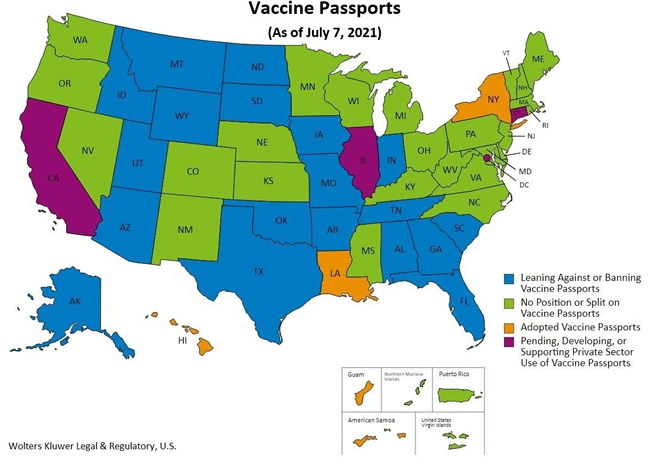
Infographic: Wolters Kluwer Labor law experts weigh in on the latest Back to Office trends in the news related to returning to the workplace, mask mandates, vaccine passports, and employer liability. (Graphic provided by Wolters Kluwer)
The latest Back to Office analysis from Wolters Kluwer Legal & Regulatory U.S. highlights recent trends in state law requirements related to mask mandates, vaccine passports, and employer liability.
Mask Mandate: As of July 8, 2021, of the 50 U.S. states, the District of Columbia, and the five U.S. territories, 20 jurisdictions have some form of mask mandate in place, while 36 jurisdictions have no mask mandates, either because they imposed no order, or because a decree was lifted or allowed to expire. Guam plans to remove its mask mandate on July 21.
Vaccine Passport: In addition, as of July 8, 2021, only three jurisdictions — Hawaii, Louisiana, and New York — have implemented a COVID-19 vaccine passport, while 19 jurisdictions have banned all or some proof of vaccination requirements. Nine states have enacted legislation prohibiting evidence of vaccination. In comparison, the other ten states have banned proof of vaccination through executive order, with most of the prohibitions applying only to government agencies. However, there are broader prohibitions in Texas and Florida, where private businesses are barred from requiring proof of vaccination.
Employer Liability: As of July 2021, 39 U.S. jurisdictions have enacted legislation or issued an executive order imposing some limitations on liability for COVID-19 transmission. Perhaps the most common feature of these laws is to provide a shield against liability for ordinary negligence and require that a plaintiff show gross negligence or intentional misconduct.
Cathleen Calhoun, J.D., a health law legal analyst at Wolters Kluwer Legal & Regulatory U.S., observes, “Mask mandates are in decline, and the trend appears likely to continue.”
“With the increasing spread of the Delta variant, employers should carefully monitor for changes in state and local masking mandates. These mandates may lead to potential liability, even in states that have coronavirus liability shields,” says Pamela Wolf, J.D., a senior employment legal analyst at Wolters Kluwer. Pamela tracks and analyzes employment issues, including White House and federal agency developments, federal regulations, court decisions, state and federal legislation, and labor and employment trends.
“As workplaces across the nation continue to reopen, it’s crucial that employers, especially those with multistate operations, understand state and local laws when developing and implementing COVID-19 policies and protocols, particularly as to vaccination requirements in the employment setting.” Pamela Wolf cautions.
Wolters Kluwer (WKL) is a global leader in professional information, software solutions, and services for healthcare; tax and accounting; governance, risk, and compliance; and legal and regulatory sectors. Wolters Kluwer says that it helps its customers make critical decisions by providing expert solutions that combine deep domain knowledge with technology and services.
Source: Wolters Kluwer
|GlobalGiants.Com|
Edited & Posted by the Editor | 8:21 AM | View the original post
Experts say variants are likely causing people to proceed with caution as survey shows more than 75% to continue wearing a mask and practicing social distancing even after COVID-19 Vaccination.
Germany and the U.S. have enormous proportions saying they will not continue wearing a mask.
Confidence in returning to restaurants, sporting events, and flying varies widely between countries. For example, only 1 in 3 in Japan will attend sporting events, while nearly all Italians are ready to eat in restaurants.
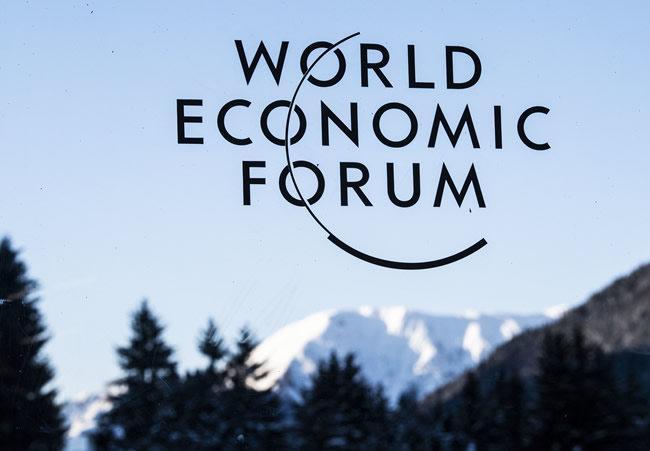
Photo: Impressions from the World Economic Forum Annual Meeting 2020 in Davos-Klosters, Switzerland, 20 January. Image provided by & Copyright © World Economic Forum / Valeriano Di Domenico.
Geneva, Switzerland, July 8, 2021 — A majority of adults said they are likely to continue socially distancing and wearing a mask in public even if they are vaccinated against COVID-19. However, there is mixed confidence across countries in returning to sporting events, eating in restaurants, flying, and using public transport.
These findings come from a new IPSOS/World Economic Forum survey that polled some 12,500 people. They conducted it between June 3-6, 2021, in Brazil, France, Germany, Italy, Japan, Mexico, Spain, the United Kingdom, and the United States.
In each of these nine countries, more than 75% say that assuming they have received a vaccine for COVID-19, they definitely will continue or may continue socially distancing from others in public places. Depending on the country, between six and eight in ten say they definitely will continue or may continue wearing a mask in public.
Genya Dana, Head of Health and Healthcare at the World Economic Forum, said: “The spread of the delta variant is likely causing people to take a pause and proceed with caution. In this dynamic and changing public health situation, it is even more important for trusted sources to be providing timely and locally relevant information.”
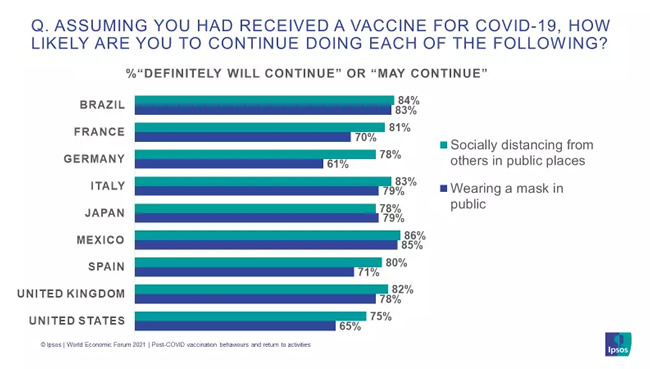
Graphic: IPSOS/World Economic Forum
Levels of certainty about continued social distancing and mask-wearing in public places vary across countries:
· More than half of those surveyed in Brazil and just under half in Italy, the U.K., France, Mexico, and Germany say they definitely will continue social distancing in public places, compared to only one-third in Japan and the U.S. However, the U.S. shows the highest proportion saying that they will not continue or haven’t been socially distancing pre-vaccination (22%).
· Gaps are even wider when it comes to mask-wearing in public: 57% in Brazil say they definitely will continue, compared to 27% in Germany. Germany and the U.S. have the most considerable proportions saying they will not continue or haven’t been wearing a mask (32% both).
• Confidence about returning to various activities
How soon one feels confident resuming different activities after receiving a vaccine for COVID-19 varies widely by type of activity and country. For most activities measured, confidence tends to be most prevalent in Mexico, followed by Spain, Italy, and France, and lowest in Japan.
For relatively common or frequent activities, proportions of those saying they would do so immediately or in a few months range from:
· 59% in Japan to 82% in Italy for eating in restaurants,
· 48% in the U.S. to 67% in Mexico for using public transit, and
· 38% in Japan to 62% in Mexico for attending sports events or concerts.
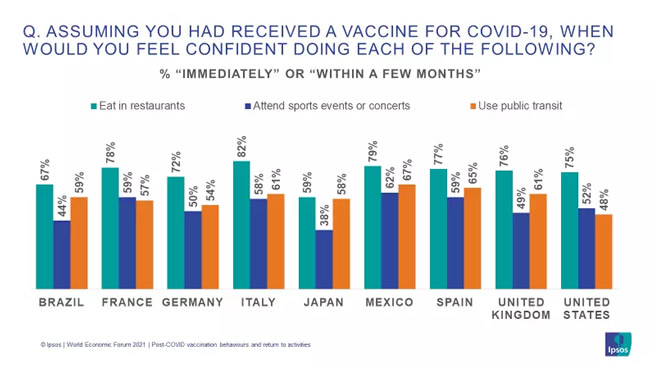
Graphic: IPSOS/World Economic Forum
When it comes to flying, proportions of those saying they would do so immediately or in a few months vary depending on their home country and the destination. They range from:
· 38% in Japan to 72% in Mexico for flying with one’s own country,
· 24% in Japan to 68% in Mexico for flying to other countries where the vaccine is available, and
· 17% in Japan to 52% in Mexico for flying to other countries where the vaccine is not yet available.
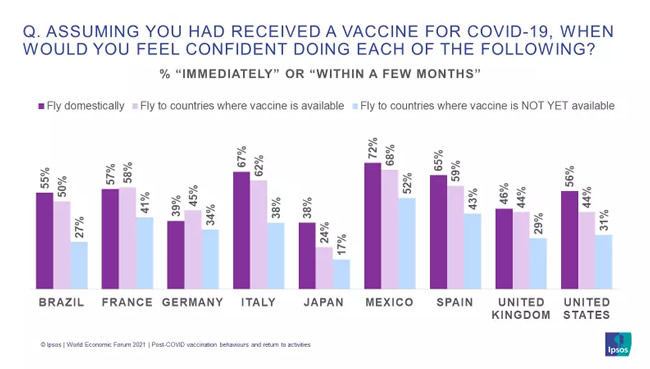
Graphic: IPSOS/World Economic Forum
These are the results of an Ipsos survey conducted June 3 to 6, 2021, on the Global Advisor online platform among adults aged 18-74 in the United States and 16-74 in Brazil, France, Germany, Italy, Spain, Japan, Mexico, and the United Kingdom. Where results do not sum up to 100 or the ‘difference’ appears to be +/-1 more/less than the actual, this may be due to rounding, multiple responses, or the exclusion of “don’t know” or not stated responses.
IPSOS is the world’s third-largest market research company, present in 90 markets and employing more than 18,000 people. Founded in France in 1975, it serves more than 5000 clients across the globe with 75 business solutions.
Sources: IPSOS, World Economic Forum
|GlobalGiants.Com|
Edited & Posted by the Editor | 1:28 AM | View the original post
• NewBeauty’s Summer issue, on newsstands now, tackles the importance of diversity in the beauty industry.


Photo: The Summer issue of NewBeauty, featuring cover star Olivia Munn, is on newsstands nationwide in the USA now.
NEW YORK, July 8, 2021 — Today, NewBeauty revealed its Summer issue, featuring a 32-page special section devoted to an expansive and inclusive definition of beauty. ‘Beauty, Redefined’ aims to highlight the vital conversation on diversity in the beauty industry.
Through this editorial, NewBeauty spotlights some of the brands leading the charge and the steps they’re taking to celebrate everyone’s unique beauty. In addition, ‘Beauty, Redefined’ explores a wide range of topics from skin health to the importance of representation. The magazine’s partners, such as BTL Aesthetics, Galderma, Merz Aesthetics, and Cutera, INC., have contributed to this NewBeauty issue. The magazine says they are all committed to delivering the most diverse and wide-reaching beauty experiences.
• Beauty, Redefined features experts including:
Lesley Clark-Loeser, MD, dermatologist, BTL Aesthetics provider, and NewBeauty Top Doctor: “Practicing dermatology in South Florida for 16 years, I serve an amazing community of all skin types, ages, and bodies of all shapes and sizes. What they all share in one way or another is a desire to feel good. BTL Aesthetics’ EmSuite can be inclusive to all our patients. When BTL says ‘Every Body Matters,’ they mean it!”
Diane Gomez-Thinnes, head of Galderma U.S.: “There’s still a lot of work for the beauty industry to do to be truly inclusive. Using a patient-first approach, Galderma focuses on normalizing aesthetic procedures and ensuring people of all skin colors can benefit.”
Judy Doo, vice president, U.S. marketing, Merz Aesthetics: “It is time to dispel the notion that beauty has one definition. By showcasing real patients and their stories, we strive to break the mold of traditional aesthetics advertising and allow consumers to relate to and engage with one another. What confidence and beauty look like to each individual is exactly that, individual.”
Dave Mowry, CEO, Cutera, INC.: “At Cutera, we are committed to establishing a foundation in diversity, equality, and inclusion. As a company, we appreciate, recognize and value all voices, bodies, differences, viewpoints, and backgrounds to broaden our perspectives and inspire innovation.”
‘Beauty, Redefined’ can be read in the Summer issue of NewBeauty, which is on newsstands in the USA now.
SANDOW media publishes this magazine. According to the publisher, “NewBeauty is an authority on beauty and the trusted resource for the most affluent and influential beauty consumer. It is the only magazine dedicated 100% to beauty, with more than 5x the beauty edit of any other magazine. It dives deep to provide valuable information founded in research and vetted by experts, empowering women to make better beauty decisions.”
Source: NewBeauty
|GlobalGiants.Com|
Edited & Posted by the Editor | 1:54 PM | View the original post
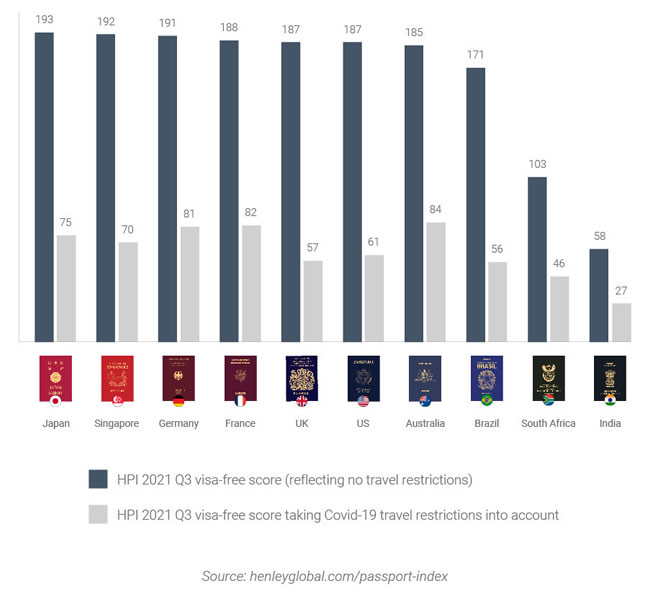
Comparison: Henley Passport Index 2021 Q3 visa-free scores with no travel restrictions vs. visa-free scores taking Covid-19 travel restrictions into account.
LONDON, July 6, 2021 — The latest results from the Henley Passport Index show that while there is cause for optimism, the reality is that cross-border travel remains restrained. Although there was some progress between January and March 2021, international mobility is just 12% pre-pandemic. Moreover, the gulf between theoretical and actual travel access remains significant.
Henley Passport Index is the actual ranking of all the world’s passports according to the number of destinations their holders can access without a prior visa.
With the postponed Tokyo 2020 Olympics just weeks away, and the country in a “quasi” state of emergency, Japan nonetheless retains its hold on the number one spot on the Henley Passport Index with a theoretical visa-free/visa-on-arrival score of 193. The index is based on exclusive data from the International Air Transport Association (IATA).
While the dominance of European passports in the Top Ten has been there for most of the index’s 16-year history, the pre-eminence of three Asian states — Japan, Singapore, and South Korea — has become the new normal. Singapore remains in 2nd place, with a visa-free/visa-on-arrival score of 192, and South Korea shares a joint-3rd home with Germany, each with a score of 191.
However, compared to the actual travel access currently available even to the holders of top-scoring passports, the picture looks very different. For example, holders of Japanese passports have access to fewer than 80 destinations (equivalent to the passport power of Saudi Arabia, which sits way down in 71st place on the ranking). In comparison, holders of Singaporean passports can access fewer than 75 destinations (equivalent to Kazakhstan, which sits in 74th place).
• Plummeting UK and US passport power
There is a similarly gloomy outlook even in countries with highly successful Covid-19 vaccine rollouts. The UK and the US currently share a joint-7th place on the index, following a steady decline since they jointly held the top spot in 2014. Their passport holders were theoretically able to access 187 destinations worldwide.
Under current travel bans, however, UK passport holders have suffered a dramatic drop of over 70% in their travel freedom, currently accessing fewer than 60 destinations globally — a passport power equivalent to Uzbekistan on the index. Likewise, US passport holders have seen a 67% decrease in their global mobility, with access to just 61 destinations worldwide — a passport power equivalent to Rwanda.
Dr. Christian H. Kaelin, Chairman of Henley & Partners, says the gap in travel freedom is now at its widest since the index began in 2006. For example, Japanese passport holders can access 167 more destinations than citizens of Afghanistan, which sits at the bottom of the index with visa-free access to just 26 countries. “Increasing isolationism and deglobalization will have profound consequences. That includes further damage to the world’s economy, a significant reduction in global mobility, and restrictions on people’s freedom.”
IATA’s Director-General, Willie Walsh, warns that the governments should not restrict international travel to those who have access to vaccination. “The freedom to travel is important. However, we need a secure system to efficiently integrate the checking of vaccines or testing certificates into the travel process. The IATA Travel Pass enables travelers to share their health credentials with governments and airlines securely.”
Exclusive research commissioned by Henley & Partners and published in its latest Q3 Global Mobility Report indicates that since the world administrations declared the pandemic, the EU has seen a drop in tourism of nearly 90%. The UK has had a 73% decline in tourist numbers. The US has experienced a 69% decrease in international visitors. And with Australia and New Zealand slamming their doors shut early in the pandemic, they received only 1% of their March 2019 visitors in March this year.
Robert Maciejewski, CEO of SIP Medical Family Office in Switzerland, says, “A legal obligation to obtain a Covid passport is unlikely in most democratic countries. Yet, not having one will probably result in de facto restrictions of your freedom, whether it comes to travel or daily activities.”
Dr. Juerg Steffen, CEO of Henley & Partners, says, “ensuring future access to multiple residence options or having dual citizenship has become even more essential for entrepreneurs and investors and their families. It mitigates volatility and reduces their exposure to risk at national, regional, and global levels.”
Source: Henley & Partners
|GlobalGiants.Com|
Edited & Posted by the Editor | 1:49 PM | View the original post
Annual tribute from the philanthropic foundation established by Andrew Carnegie focuses on naturalized citizens who live their lives in service to society.
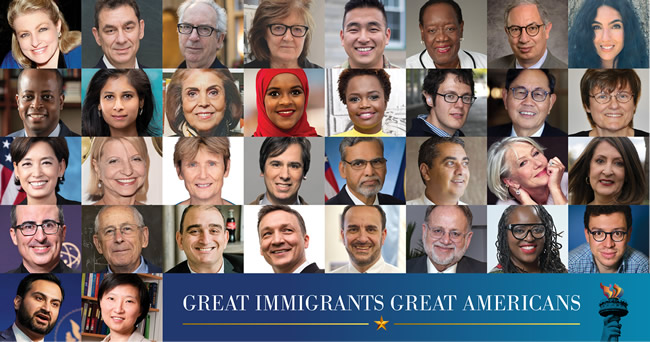
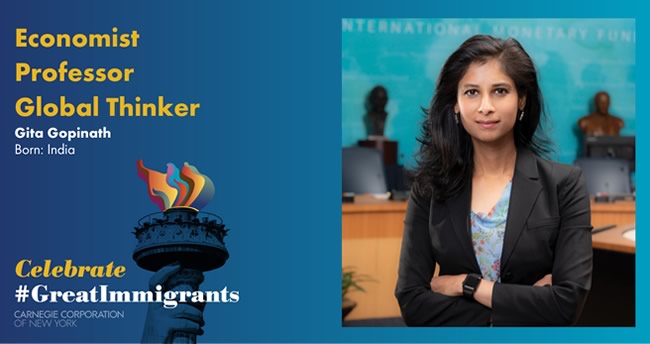
New York, July 3, 2021 — Carnegie Corporation of New York released its annual list of Great Immigrants, honoring 34 individuals who have enriched and strengthened the American society and its democracy through their contributions and actions.
The Class of 2021 represents more than 30 countries of origin. It emphasizes service to society, including honorees recognized for helping others as medical providers and researchers, as advocates for the disadvantaged, disabled, and disenfranchised, and as changemakers in politics, voting rights, climate change, and teaching. Overall the honorees have a wide variety of backgrounds and careers, including the chairman and CEO of Pfizer; the head of Google’s interactive design; the creator of language-learning software Duolingo; winners of the Pulitzer, Nobel, Vilcek, and Beard prizes; and celebrities such as actress Helen Mirren and comedian John Oliver.
Among honorees working in service to society:
Gita Gopinath (India): Chief Economist, International Monetary Fund. Gopinath took a “leave of public service” from her job teaching international studies and economics at Harvard University to assume the position of Chief Economist of the International Monetary Fund. Called “one of the world’s outstanding economists,” Gopinath focuses her research on international finance and macroeconomics.
Growing up in India, Gita Gopinath did not know anyone who worked in economics. It was more common for children to aspire to become a doctor or an engineer. She studied science through high school. When her parents’ friends suggested that she would enjoy success working for the country’s administrative services, she went to Delhi to study economics. From there, Gopinath’s interest in international finance and economics only continued to grow.
Jun Cho (South Korea): Delaware National Guardsman. He missed his naturalization ceremony when deployed to Washington, D.C., after the January 6 riots. He was granted a private ceremony after a Congressman heard about his predicament.
Gisele Barreto Fetterman (Brazil): Anti-poverty and social justice advocate. She founded multiple nonprofits to address food and economic insecurity and support women entrepreneurs in Pennsylvania.
Wayne A. I. Frederick (Trinidad and Tobago): President and professor of surgery at Howard University. He developed methods for narrowing racial, ethnic, and gender disparities in cancer outcomes.
Karine Jean-Pierre (Martinique): Principal deputy press secretary for the Biden White House and former chief of staff for Democratic vice-presidential nominee Kamala Harris. She has been a campaign organizer and activist, author, and lecturer.
Katalin Karikó (Hungary): Scientist and senior vice president of BioNTech. She conducted breakthrough mRNA research foundational to developing the Pfizer-BioNTech and Moderna COVID-19 vaccines.
Young Kim (South Korea): U.S. Congresswoman from California. She has focused on supporting small businesses as part of the COVID-19 recovery and is the third Korean American woman elected to Congress.
Herro Mustafa (Iraq): U.S. Ambassador to Bulgaria who joined the Foreign Service in 1999. She has held numerous high-level diplomatic posts, including senior advisor on the Middle East to Joe Biden (2009-2011).
Vincenzo Piscopo (Venezuela): President and CEO of United Spinal Association. He has been a longtime advocate for disability rights and accessible transportation, helping people with motor disabilities worldwide.
Jorge Pulleiro (Argentina): Idaho’s 2021 Teacher of the Year who teaches Spanish in a dual immersion program. He is a U.S. Army veteran and standout graduate of the military’s Troops to Teachers program.
Pedro A. Sanchez (Cuba): Professor at the University of Florida. He has dedicated his career to eliminating world hunger and absolute rural poverty, protecting and enhancing degraded soils in South America and Africa.
Nsé Ufot (Nigeria): Longtime civil, human, and worker rights advocate. She is the executive director of the New Georgia Project, which provides voter education aimed at strengthening democracy.
Ali Zaidi (Pakistan): Deputy White House national climate advisor. He designs and implements federal policies and public-private partnerships to increase energy security, reduce pollution, and create green jobs.
The Great Immigrants initiative aims to increase public awareness of immigration’s role in the United States, reflecting the priorities of Andrew Carnegie, a self-made industrialist. In 1911, he established Carnegie Corporation of New York, a grantmaking foundation dedicated to the causes of democracy, education, and international peace. To date, the Corporation has honored more than 600 outstanding immigrants.
The 2021 honorees, who mark the 16th class of Great Immigrants, will be recognized with a full-page public service announcement in the New York Times on the Fourth of July and through a social media campaign.
Source: Carnegie Corporation of New York
|GlobalGiants.Com|
Edited & Posted by the Editor | 12:22 PM | View the original post

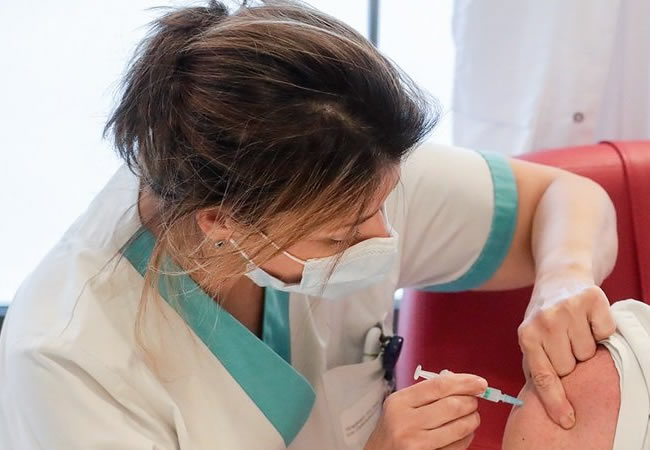
NEW BRUNSWICK, N.J., July 1, 2021 — Johnson & Johnson today announced data demonstrating its single-shot COVID-19 vaccine’s robust and persistent activity against the rapidly spreading Delta variant and other highly prevalent SARS-CoV-2 viral variants. In addition, the data showed that the durability of the immune response lasted through at least eight months, the length of time evaluated to date. The two preprint study summaries have been submitted today to bioRxiv.
“Today’s newly announced studies reinforce the ability of the Johnson & Johnson COVID-19 vaccine to help protect the health of people globally,” said Paul Stoffels, M.D., Vice Chairman of the Executive Committee, and Chief Scientific Officer at Johnson & Johnson. “We believe that our vaccine offers durable protection against COVID-19 and elicits neutralizing activity against the Delta variant. In addition, it adds to the robust body of clinical data supporting our single-shot vaccine’s ability to protect against multiple variants of concern.”
“Current data for the eight months studied so far show that the single-shot Johnson & Johnson COVID-19 vaccine generates a strong neutralizing antibody response that does not wane; rather, we observe an improvement over time. In addition, we observe a persistent and particularly robust, durable cellular immune response,” said Mathai Mammen, M.D., Ph.D., Global Head, Janssen Research & Development, Johnson & Johnson. “With each new dataset, we build on our solid foundation of evidence that our single-shot COVID-19 vaccine plays a critical role in ending the pandemic, which continues to evolve and pose new challenges to global health.”
• Demonstrated neutralizing solid antibody activity against the Delta (B.1.617.2) variant
A preprint submitted by the Company today to bioRxiv contains a new analysis in the Phase 3 ENSEMBLE study. These data showed that the Johnson & Johnson single-shot COVID-19 Vaccine elicited neutralizing antibody activity against the Delta variant at an even higher level than what it did for the Beta (B.1.351) variant.
A single dose of the Johnson & Johnson COVID-19 vaccine generated neutralizing antibodies against a range of SARS-CoV-2 variants of concern, which increased over time. For example, the average neutralizing titer at eight months exceeded that average at 29 days, including against the increasingly prevalent and more transmissible Delta (B.1.617.2) variant, the partially neutralization-resistant Beta (B.1.351), the Gamma (P.1) variants, and others, including the Alpha (B.1.1.7), Epsilon (B.1.429), Kappa (B.1.617.1), D614G, as well as the original SARS-CoV-2 strain (WA1/2020).
Johnson & Johnson’s single-dose COVID-19 vaccine is now available in many regions and countries on a not-for-profit basis during the emergency pandemic period.
The vaccine received Emergency Use Authorization (EUA) in the United States on February 27 and Conditional Marketing Authorization (CMA) by the European Commission on March 11, 2021. The World Health Organization (WHO) issued Emergency Use Listing on March 12, 2021. In addition, the Company received an interim recommendation by the Strategic Advisory Group of Experts (SAGE) on Immunization for the WHO on March 17, 2021. Many more authorizations have been granted in countries worldwide, and regulatory submissions are ongoing.
• Storage and Distribution
The Johnson & Johnson COVID-19 single-dose vaccine is compatible with standard vaccine storage and distribution channels with ease of delivery to remote areas. The vaccine is estimated to remain stable for two years at -4°F (-20°C) and a maximum of 4.5 months at average refrigeration temperatures. The Company will ship the vaccine using the same cold chain technologies it uses today to transport other medicines.
• Important Safety Information
• WHAT SHOULD YOU MENTION TO YOUR VACCINATION PROVIDER BEFORE YOU GET THE COVID-19 VACCINE?
Tell the vaccination provider about all of your medical conditions, including if you:
have any allergies
have a fever
have a bleeding disorder or are on a blood thinner
are immunocompromised or are on a medicine that affects your immune system
are pregnant or plan to become pregnant
are breastfeeding
have received another COVID-19 vaccine
Source: Johnson & Johnson
|GlobalGiants.Com|
Edited & Posted by the Editor | 6:57 AM | View the original post

SINGAPORE, June 30, 2021 — Pinterest, Inc. (NYSE: PINS) today announced that it is expanding Idea Pins, its multi-page video Pin format, to all creators in India, Indonesia, Spain, Italy, Ireland, New Zealand, Brazil, Mexico, Argentina, Chile, Columbia, Peru, Japan, and Sweden. This new access and capability will empower anyone with a business account in these countries to create inspiring content and closer interaction with their audiences, building more engaged communities directly on Pinterest.
Idea Pins make it easy for creators to publish high-quality, long-lasting, save-able content directly to Pinterest. The number of Idea Pins created daily has grown by nearly 4x since January. With this latest international expansion, Pinterest highlights the creators worldwide who are making the ideas and encouraging Pinners to follow them.
“We believe the best inspiration comes from people with passions who want to bring positivity and creativity into the world. From creators to hobbyists to publishers, Pinterest is a place where anyone can publish great ideas and discover inspiring content. With Idea Pins, creators get empowered to share their passions and inspire and grow their audiences. By helping people on Pinterest spark creativity, try new things, build confidence, and be themselves, creators inspire to shape a life you love.” said Evan Sharp, Co-Founder, Chief Design and Creative Officer, Pinterest.
Idea Pins are an evolution of Pinterest’s Story Pins, with a new name to better match its uniqueness. Starting today, creators will also have a suite of new publishing tools including, video-first features, new editing tools, and updates to make creating Idea Pins easier and more creative.
• Idea Pin creation now includes:
Creators with early access to Idea Pins like Chef Kunal Kapur, Masoom Minawala, and Kritika Khurana in India have already grown their audiences, with cooking tutorials on fun and easy Indian dishes, fashion ideas for what to wear for Holi, and fresh beauty tutorials. Publishers like TimesOfIndia Food, ETimes Lifestyle, and Femina India have also started to use Idea Pins to inspire their audiences across a diverse range of verticals, including beauty, fashion, food, and well-being.
“Idea Pins are a cool and creative way to showcase new recipes, share comprehensive ideas and upcoming projects with the audience. Since we were early adopters of the feature, we were able to see huge growth in minimal time. Some Idea Pins have crossed more than a million views in a couple of days. That’s a lot of eyeballs for food videos! It’s a great way to catch people’s attention and inspire them.” Pinterest Creator and Chef Kunal Kapur said.
To help creators build their audience, Pinterest is also introducing new ways for Pinners to discover Idea Pins. Starting today, all Pinners will see Idea Pins from creators they follow right at the top of their home feed. Following streams give Pinners a new way to see fresh content from creators in more places, including search, the Today tab, and the top of creator profiles.
For Pinners, this means the ideas within a Pin will be more engaging and actionable. Pinterest has seen 9x the average comment rate on Idea Pins compared to standard Pins.
With these updates, Pinterest is continuing its journey to build a platform where Pinners worldwide can discover content and ideas that feel personalized, relevant, and reflective of who they are.
People around the world come to Pinterest for inspiration. Pinterest is a visual discovery engine where people find inspiring creators, shop new products, and seek out ideas to take offline. Headquartered in San Francisco, Pinterest launched in 2010 and has more than 475 million monthly active users. People have saved nearly 300 billion Pins across a range of interests, from creating a home office, cooking a new recipe to finding their next vacation destination.
Source: Pinterest
|GlobalGiants.Com|
— We are already on Pinterest. Check us at @GlobalGiants.
Edited & Posted by the Editor | 9:12 AM | View the original post





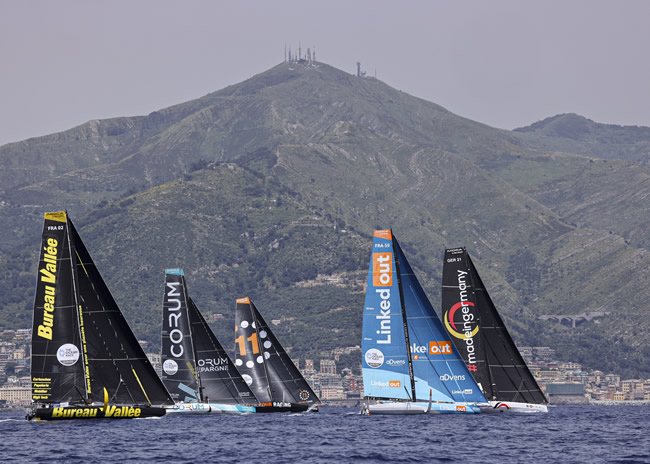

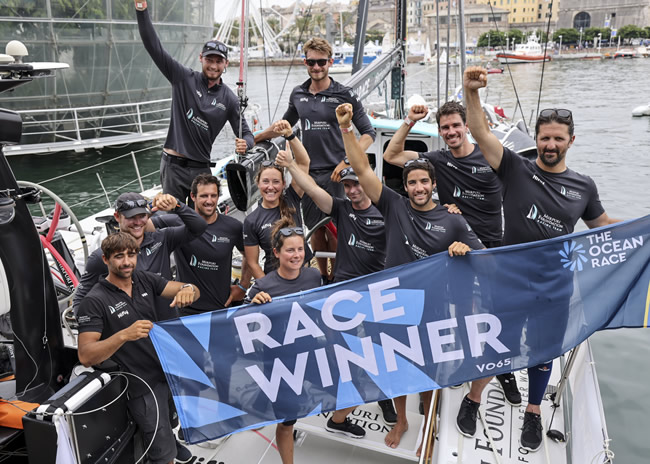
Photos: The Ocean Race Europe, June 2021. Images provided by & copyright © Sailing Energy/The Ocean Race.
Genova, Italy, June 23, 2021 — Class leaders Offshore Team Germany (GERMANY) and Mirpuri Foundation Racing Team (PORTUGAL) are the respective IMOCA and VO65 winners in the inaugural edition of The Ocean Race Europe, after an exciting final day of coastal racing in Genova, Italy on June 19.
The atmosphere on the pontoons was ripe with anticipation and nervous energy the June 19 morning as the 12 competing crews from around the world departed the dock for the final time on the new three-week-long multi-stage professional yacht racing event.
The points spread close at the top of the seven-boat VO65 and five-boat IMOCA 60 fleets, and with bonus points up for grabs for the top three finishers in each class in the planned 90-minute sprint race around the Gulf of Genova, the final standings remained open.
Windless conditions at the scheduled start time of 1200 CEST / 1000 UTC forced the race committee to postpone until a new breeze arrived, and racing finally got underway at around 1340 local time. Racing took place in 7 to 10 knots of southeasterly sea breeze.
The VO65 start was a congested all-action affair, with two boats - Sailing Team Poland (POL) and The Austrian Ocean Race Project (AUT) - having to tack around after being forced outside the committee boat end of the start line. Three others - AkzoNobel Ocean Racing (NED), Ambersail-2 (LTU), and Team Childhood I (NED) - having to restart after being called over early by the race committee.
But staying clear of the melee going on all around them was the overall VO65 class leaders Mirpuri Ocean Racing Team - led by Yoann Richomme - who sailed off the line unfettered and into a clear lead.
Despite some nervous moments on the final run to the finish, they made an uncharacteristic sail handling error while hoisting the A4 spinnaker and came under attack from Bouwe Bekking’s Sailing Poland. Ultimately, the Portuguese team held on to their early advantage to take the coastal race win and seal overall victory in The Ocean Race Europe.
Sailing Team Poland’s second-place inshore race finish was enough to elevate them to second overall, tied on points with the now third-placed Dutch entry AkzoNobel Ocean Racing, led by Australian Chris Nicholson.
Meanwhile, the battle for the overall top spot in the IMOCA class was a near photo finish for second place in the coastal race between Robert Stanjek’s Offshore Team Germany and Thomas Ruyant’s LinkedOut.
Offshore Team Germany had led around the first two legs of the triangle-shaped racecourse. Still, it dropped to second early on the final downwind leg behind the American-entry 11th Hour Racing Team after a poorly executed tack rounding the second mark of the course.
The spectators on the water and watching the worldwide live video feed held their breath as the two yachts overlapped at the finish line. The German boat was under threat from the rapidly advancing LinkedOut - a team they would have to beat to avoid being relegated to third overall. However, Offshore Team Germany held on to win the race and the overall series by the smallest margin.
“I’m super-happy. I’ve prepared this team for four or five years, and I’m so happy we managed to do so well,” Stanjek said dockside after racing.
“My idea to build a successful team for The Ocean Race was to combine Olympic sailors with experienced offshore sailors, and this is what we executed, and it proved to be successful. We’re getting stronger every day. There are no egos on board, everyone is listening, and it’s a good learning atmosphere. I’m very proud of the team.
“We learned heaps about the boat, about the race profile, how to manage the watch system onboard, communications; it’s much more than just getting the win. So we are taking a lot of lessons home with us.”
Today’s win for the 11th Hour Racing Team moved them up to second place overall in the IMOCA class, one point ahead of the French crew on LinkedOut, who dropped to third altogether.
“We showed a lot of fight today, and that shows a lot about this group,” said skipper Charlie Enright. “I’m proud of what we did.”
For the Portuguese Mirpuri Foundation Racing Team, the VO65 class victory resulted from a composed and consistent performance that saw the team collect maximum points on offshore legs two and three and their homeport inshore race in Cascais.
Richomme’s crew had put in several weeks of Atlantic training before The Ocean Race Europe start from Lorient, France, on Saturday, May 29. As the only team in the VO65 fleet to invest in a new sail wardrobe, they began the race as favorites - they comfortably lived up to it.
“Job done. Mission accomplished,” said Richomme from onboard immediately after the finish. “I think we like to make things hard for ourselves. We lost the kite on the first hoist, and I thought we would get passed by two boats. But we managed to get it back up in the air again.
“From the start, we were leading - it was a tough one because all the boats around us were over the line, so it was pretty tense.
“We could not have finished on a better note - winning this last coastal race here in Genoa. It was the best way to make sure we would win the event overall, so we are thrilled.
“It’s been a considerable effort to get to here… The hard work and the training, and everything we did in Cascais for months paid off. The whole crew has been fantastic. There’s a lot of talent in that crew, and I think we managed to use it as best as possible.
“I think The Ocean Race Europe is a great concept. I think it should be a month-long, around Europe, very intense Â- this is the best format we can have for racing. I think having a race that links countries in Europe makes so much sense.”
Following racing, there was an official prize-giving ceremony in the evening at the event village in Genova. The winning teams in the IMOCA and VO65 class were presented with a trophy to celebrate their achievements in the inaugural edition of The Ocean Race Europe.
• The Ocean Race Europe - Final Leaderboards
IMOCA
VO65
• Genova Coastal Race Results
IMOCA
VO65
Source: The Ocean Race
|GlobalGiants.Com|
The Ocean Race Europe — Leg 3.
Edited & Posted by the Editor | 12:05 PM | View the original post


Photo: L’Oréal Paris, Lights On Women Award, Kate Winslet, 2021 Juror.
CANNES, France, June 22, 2021 — At the 74th Festival de Cannes, L’Oréal Paris has announced the Lights On Women Award, which will honor one rising female filmmaker in partnership with the Short Films competition of the Festival de Cannes. The winner will be hand-picked from the Festival de Cannes’ Short Films competition and international film schools’ short film programs. The final choice will be determined and announced by Academy award-winner and L’Oréal Paris spokesperson Kate Winslet - the Award’s first Juror - during a special prize ceremony at the Jeune Cinéma dinner in Cannes on July 16.
“This exciting partnership with L’Oréal Paris represents a natural extension of the brand’s ongoing support for Cannes and the wider cinema community,” said Thierry Frémaux, director of the Festival international du film de Cannes. “The Lights On Women Award will offer a much-needed opportunity to honor a deserving creator and aligns with the broader commitment of the Short Films competition and international film schools’ short film programs to recognize the female talent of tomorrow,” he added.
The winner of the inaugural Lights On Women Award will receive financial support of up to 30,000€. This unique recognition will also offer the winner a platform for increased visibility and gain access to a “sisterhood” of cinematic talent.
“L’Oréal Paris is a feminine and feminist brand; we believe in empowering women to overcome barriers and to have a long-term positive social impact within their communities,” said Delphine Viguier-Hovasse, Global Brand President, L’Oréal Paris. “The massive under-representation of women in film requires large-scale support, and I am proud to use our brand platform and resources to stand up for women’s visibility with the help of the incredible female actors who represent our brand. I firmly believe in advocating for talented women and holding space for them to shine.”
Actor Kate Winslet added, “What an honor to preside as Juror over this remarkable recognition for women filmmakers and to have an opportunity to celebrate such incredible talent. We must work together as a community to pursue gender parity within our industry, and I am delighted to support the L’Oréal Paris family on this important initiative.”
Source: L’Oréal Paris
|GlobalGiants.Com|
Edited & Posted by the Editor | 2:59 AM | View the original post


Photo: Erik Messerschmidt poses backstage with the Oscar for Cinematography and Halle Berry during the live ABC Telecast of The 93rd Oscars at Union Station in Los Angeles, CA, on Sunday, April 25, 2021. Image provided by & copyright © Matt Petit / A.M.P.A.S. [File Photo]
LOS ANGELES, CA - The Academy of Motion Picture Arts and Sciences today announced its newly elected 2021-2022 Board of Governors. The governors will take office at the first scheduled board meeting of the new term.
• Elected to the Board for the first time:
• Incumbent governors reelected to the Board:
• Returning to the Board after a hiatus:
They will join returning governors Kate Amend, Craig Barron, Howard Berger, Charles Bernstein, Jon Bloom, Rob Bredow, Ruth E. Carter, Kevin Collier, Laura Dern, Teri E. Dorman, Dody J. Dorn, Ava DuVernay, Linda Flowers, DeVon Franklin, Rodrigo GarcÃa, Donna Gigliotti, Whoopi Goldberg, Lynette Howell Taylor, Mark Johnson, Larry Karaszewski, Laura Karpman, Christina Kounelias, Ellen Kuras, David Linde, Isis Mussenden, Jennifer Yuh Nelson, Jan Pascale, Stephen Rivkin, Eric Roth, David Rubin, Steven Spielberg, Wynn P. Thomas, Nancy Utley, Mandy Walker, Roger Ross Williams, Janet Yang, and Debra Zane.
As a result of this election, the number of women Academy governors increases from 26 to 31, and the number of governors from underrepresented racial/ethnic communities increases from 12 to 15.
The Academy has 17 branches. Three governors represent each branch. The governors may serve up to two three-year terms (consecutive or non-consecutive), followed by a two-year hiatus, after which eligibility renews for up to two additional three-year terms with a lifetime maximum of 12 years. The Board of Governors sets the Academy’s strategic vision, preserves the organization’s financial health, and assures its mission.
Source: The Academy of Motion Picture Arts and Sciences
|GlobalGiants.Com|
Edited & Posted by the Editor | 10:10 AM | View the original post
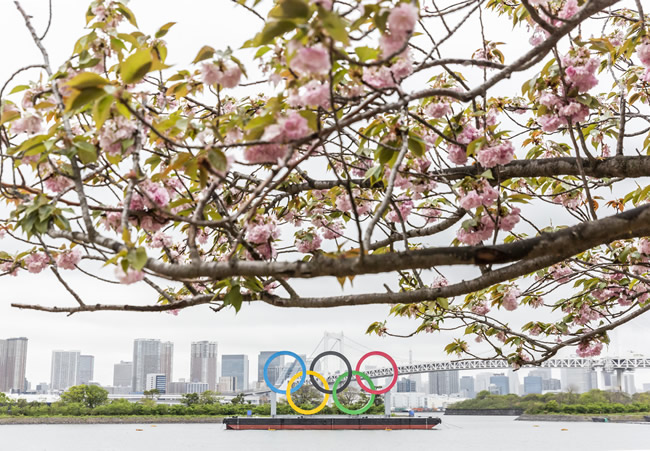
Photo: Tokyo 2020 - 100 days to go. General view. Image provided by & copyright © 2021 - International Olympic Committee/Yuichi Yamazaki.
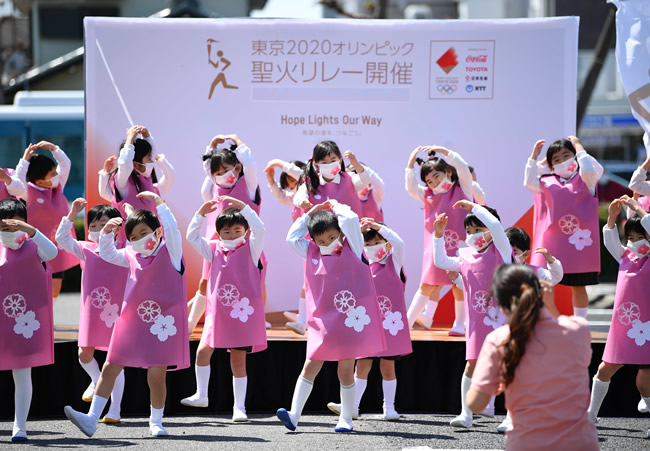
Photo: Aichi, JAPAN - April 5, 2021. The Olympic Torch Relay in Kasugai City, Aichi prefecture, Japan. Image provided by & copyright © 2021 - International Olympic Committee.
Tokyo, June 21, 2021 — Today, on June 21, the five parties, namely the International Olympic Committee (IOC), the International Paralympic Committee (IPC), the Tokyo 2020 Organising Committee, the Tokyo Metropolitan Government (TMG), and the Government of Japan (GoJ), met to discuss spectator limits for the Olympic Games Tokyo 2020.
They took the following main decisions:
In light of the government’s restrictions on public events, the spectator limit for the Olympic Games will be “50 percent of venue capacity, up to a maximum of 10,000 people” at all venues. (Students in the schools’ spectator program and their supervisors will not be considered in these numbers since they are not spectators.)
The current competition schedule remains unchanged. In principle, spectators will be admitted to events subject to the above limits.
However, suppose a state of emergency or other priority measures aimed at preventing infection gets implemented at any time after July 12, 2021. In that case, restrictions on spectator numbers at the Games, including non-spectator competitions, will be based on the content of the state of emergency or other relevant measures in force at that time.
In the event of any rapid change in infection status and the capacity of the medical care system, the five parties will meet promptly to consider further measures.
The Japanese parties have formulated guidelines for spectators aimed at ensuring safe and secure environments. These stipulate that —
Given the COVID-19 situation, the Japanese parties may cancel or reduce the scale of any live sites and public viewing events to minimize the movement of people. They may review the other Games-related events and establish new safe and secure ways of cheering and supporting the athletes.
The organizers would implement a framework to monitor the status of infections and medical care using expert advice.
The five parties would deliver consistent and unified messages aimed at ensuring safe and secure Games.
The Paralympic Games’ equivalent policies will be decided by July 16, 2021, a week before the Olympic Games opening.
There will be strong coordination and cooperation with local governments in Japan to ensure compliance with the above guidelines.
The situation will be monitored in Japan and abroad, including the status of the different variants of the coronavirus. The organizers will promptly take all necessary action. Vaccination of those involved with the Games will continue. The organizers would further update the vaccination status.
There are 32 days to go until the Olympic Games. There are 64 days to go until the Paralympic Games. The five parties will continue to work together to ensure safe and secure Games for all.
Source: International Olympic Committee
|GlobalGiants.Com|
Edited & Posted by the Editor | 11:18 AM | View the original post
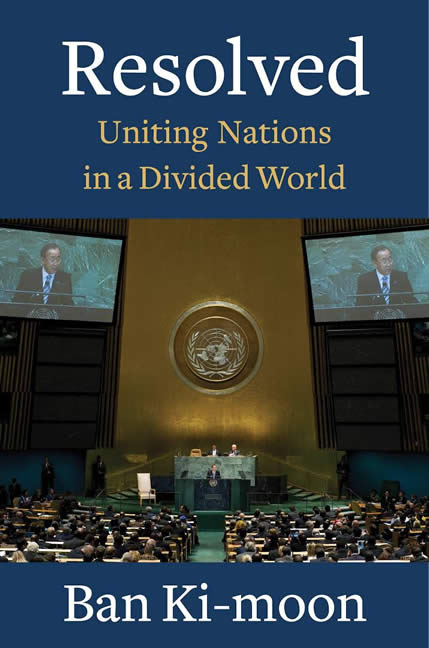
Photo: The cover of “Resolved: Uniting Nations in a Divided World” by Ban Ki-moon. Columbia University Press.
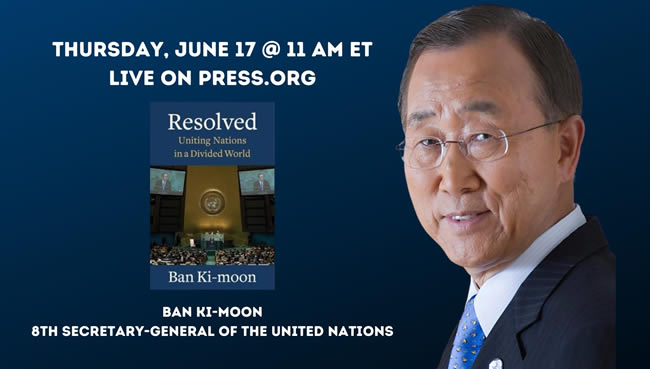
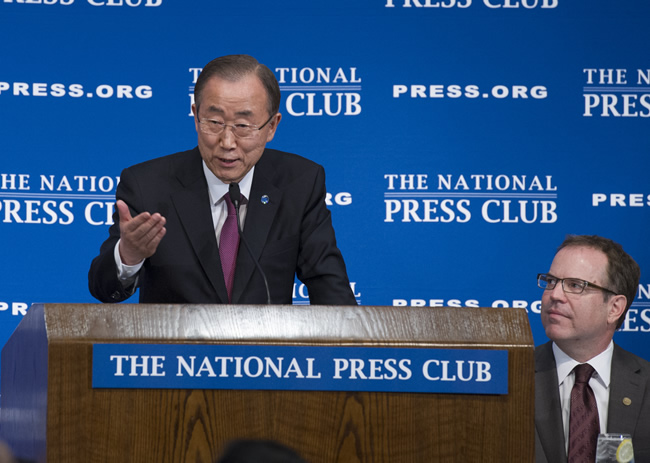
Photo: UN Secretary-General Ban Ki-moon (left) addresses the National Press Club in Washington, D.C. He discussed the challenges and opportunities that the United Nations faces in its 70th year, from fostering sustainable development and dealing with climate change to confronting violent extremism. He took questions during an hour-long session. At right is John Hughes, President of the National Press Club. April 16, 2015. UN Photo/Eskinder Debebe. [File Photo].
Washington, DC, June 18, 2021 — Former United Nations Secretary-General Ban Ki-moon called for a return to multilateral diplomacy and for people to be “global citizens.” He was speaking during a National Press Club Virtual Headliners Book Event on Thursday.
In a discussion coinciding with the release of his new book “Resolved: Uniting Nations in a Divided World,” Ban said global alliances have fractured amid the crises of coronavirus, climate change, and refugees fleeing conflict. He blamed world leaders for not doing enough.
“Why are we not doing more and better? For me, the fault most often lies with the leaders of the world,” Ban said. “Too many autocrats and also dictators put themselves before their countries and before the people who elected them.”
That fracturing of global alliances undermined the world’s response to COVID-19, mainly when the United States chose to withdraw from the World Health Organization, a move Ban called “totally unacceptable.” And he said the wealthiest countries “looked inward first,” meaning an uneven distribution of vaccines.
However, the recent G7 summit in the United Kingdom gave Ban some reasons for optimism as leaders there agreed to share 1 billion doses with poorer countries and reaffirmed their pledge of $100 billion a year for poorer countries to help them fight climate change.
But he criticized the United States, which under the Trump administration, stepped back from the global fight against climate change and withdrew from the Paris climate accord.
“This kind of leadership has shown no concern to the people, and it is only the people on the ground who will suffer,” Ban said. “This is what I found heartbreaking.”
And he said the UN could do more to help, especially in Syria, which has struggled for a decade amid civil war and a humanitarian crisis. Instead, Ban said, it is paralyzed and unable to “deliver timely, effective, and powerful messages or actions because of the divisions among the Security Council members, particularly veto-power members.”
Multilateralism has borne good work in recent years, Ban said, especially in getting 196 signatories for the Paris climate accord and adopting the UN’s 17 Sustainable Development Goals. But he said there is “so much work ahead,” not only in fighting climate change but also promoting peace in Myanmar, Afghanistan, Israel, and elsewhere.
Ban served as UN Secretary-General from January 2007 to December 2016. His tenure coincided with numerous incidents, including the Arab Spring, nuclear proliferation in Iran and North Korea, the Ebola epidemic, and brutal new conflicts in Central Africa.
Ban, who served as a South Korean diplomat and foreign minister before becoming the UN’s eighth Secretary-General, said his home country showed what is possible. Ban recalled being raised during the Korean War, then coming of age and watching the country grow from a dictatorship to a “stable and prosperous democracy.”
“Without the United Nations, Korea would not be as it is today,” Ban said.
Resolved is Ban Ki-moon’s account of his decade at the organization’s helm during a period of historical turmoil and promise. Meeting challenges and resistance with a belief in the UN’s peacekeeping mission, development, and human rights, he steered the United Nations through a volatile period. As secretary-general, Ban also forged global agreements to fight extreme poverty and address the climate crisis.
Ban performed what has been called “the impossible job on this earth” with a genuine belief in collective action and global transformation. Freed from the diplomatic constraints of a lifetime of public service, he offers a candid assessment of the people and events that shape this era and a bracing analysis of what lies ahead.
The one-hour program streamed live on the National Press Club’s website and YouTube Channel. Thus, it was accessible to both the media and members of the general public.
Founded in 1908, the National Press Club is the “World’s Leading Professional Organization for Journalists.” The Club has about 3,000 reporters, editors, and professional communicators worldwide, representing nearly every major news organization. It hosts almost 2,000 events per year in its 54,000 square foot facility located in downtown Washington, just three blocks from the White House.
Source: National Press Club, Washington, DC
|GlobalGiants.Com|
— The Editor is a Member of the National Press Club.
Edited & Posted by the Editor | 3:56 AM | View the original post
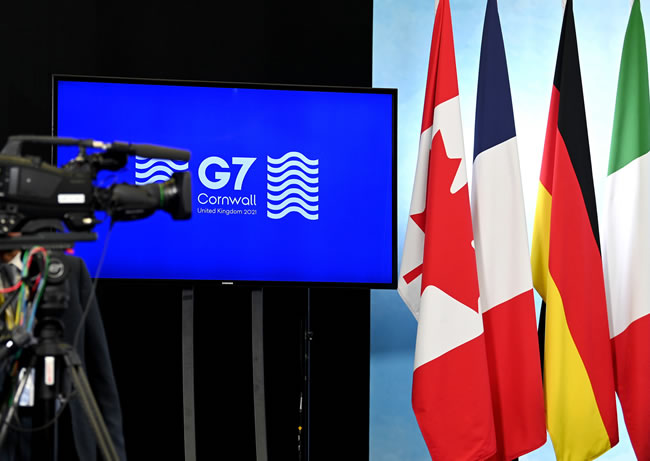
Photo: Setting up the US press conference during the G7 Summit at Newquay airport, Cornwall, UK, on 13th June 2021. Image provided by & copyright © Karwai Tang/G7 Cornwall 2021.
— SUMMARY OF CARBIS BAY G7 SUMMIT COMMUNIQUÉ —
• Our Shared Agenda for Global Action to Build Back Better
We, the Group of Seven leaders, met in Cornwall on 11-13 June 2021, determined to beat COVID-19 and build back better. We remembered everyone who has been lost to the pandemic and paid tribute to those still striving to overcome it. Inspired by their example of collaboration and determination, we gathered united by the principle that brought us together initially, that shared beliefs and shared responsibilities are the bedrock of leadership and prosperity. Guided by this, our enduring ideals as free open societies and democracies, and by our commitment to multilateralism, we have agreed on a shared G7 agenda for global action to:
End the pandemic and prepare for the future by driving an intensified international effort, starting immediately, to vaccinate the world by getting as many safe vaccines to as many people as possible as fast as possible. Total G7 commitments since the start of the pandemic provide for a total of over two billion vaccine doses, with the pledges since we last met in February 2021, including here in Carbis Bay, providing for one billion doses over the next year. At the same time, we will create the appropriate frameworks to strengthen our collective defenses against threats to global health by:
Reinvigorate our economies by advancing recovery plans that build on the $12 trillion of support we have put in place during the pandemic. We will continue to support our economies for as long as is necessary, shifting the focus of our support from crisis response to promoting growth into the future. We would work with plans that create jobs, invest in infrastructure, drive innovation, support people, and level up so that no place or person, irrespective of age, ethnicity, or gender, is left behind.
Secure our future prosperity by championing freer, fairer trade within a reformed trading system, a more resilient global economy, and a fairer global tax system that reverses the race to the bottom. We will collaborate to ensure future frontiers of the global economy and society, from cyberspace to outer space, increase all people’s prosperity and well-being while upholding our values as open societies. We are convinced of the potential of technological transformation for the common good per our shared values.
Protect our planet by supporting a green revolution that creates jobs, cuts emissions, and seeks to limit the rise in global temperatures to 1.5 degrees. We commit to net-zero no later than 2050, halving our collective emissions over the two decades to 2030, increasing and improving climate finance to 2025, and conserving or protecting at least 30 percent of our land and oceans by 2030. We acknowledge our duty to safeguard the planet for future generations.
Strengthen our partnerships with others around the world. We will develop a new partnership to build back better for the world through a step-change in our approach to investment for infrastructure, including through an initiative for clean and green growth. We resolve to deepen our current partnership to a new deal with Africa. It includes magnifying support from the International Monetary Fund for countries that most need it. It would support our aim to reach a total global ambition of $100 billion.
Embrace our values as an enduring foundation for success in an ever-changing world. We will harness the power of democracy, freedom, equality, the rule of law, and respect for human rights to answer the most critical questions and overcome the most significant challenges. We will do this to value the individual and promote equality, especially gender equality, including by supporting a target to get 40 million more girls into education and at least $2 billion for the Global Partnership for Education.
We shall seek to advance this open agenda in collaboration with other countries and within the multilateral rules-based system. In particular, we look forward to working alongside our G20 partners and with all relevant International Organisations to secure a cleaner, greener, freer, fairer and safer future for our people and planet.
••••••••
Source: G7 SUMMIT 2021
|GlobalGiants.Com|
Edited & Posted by the Editor | 2:50 AM | View the original post
As Mayors Challenge Innovation Competition Proceeds, 50 Finalist Cities Set to Strengthen Ideas with Residents in Coming Months.
Grand Prize Winners to be Chosen Early 2022.
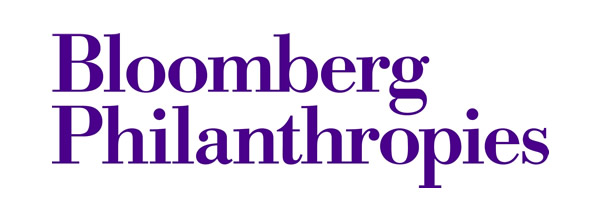

Photo: Bloomberg Philanthropies, the Aspen Institute, and The Atlantic co-host CityLab 2017 in Paris. Image provided by & copyright © Bloomberg Philanthropies. [File Photo]
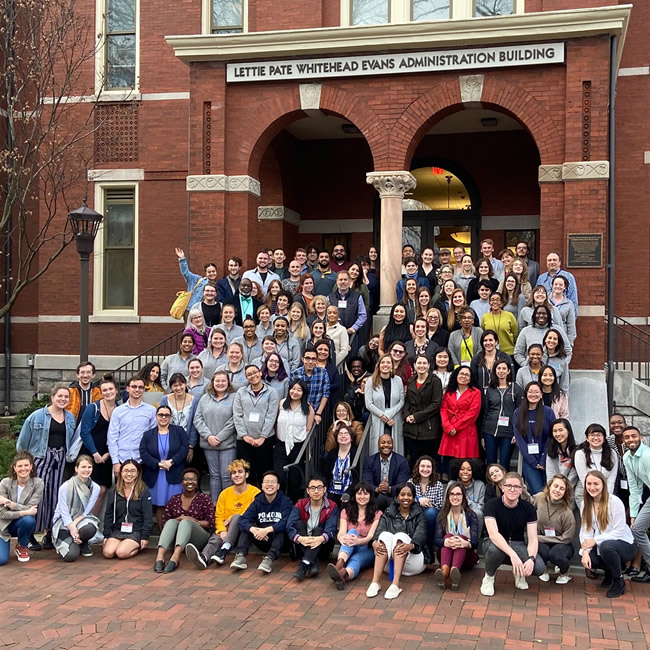
Photo: Bloomberg Philanthropies, in partnership with the Georgia Institute of Technology and Emory University, hosted over 130 advisors and staff from the CollegePoint Initiative for the program’s 2020 Midyear convening. CollegePoint is a virtual advising initiative that aims to increase the number of high achieving low and moderate-income students who attend top colleges across the USA. Image provided by & copyright © Bloomberg Philanthropies. [File Photo]
NEW YORK, June 15, 2021, — Bloomberg Philanthropies today announced the 50 Champion Cities, representing the boldest urban innovations of the past year, which will advance to the final stage 2021 Global Mayors Challenge. This worldwide innovation competition encourages and spreads the cities’ most promising ideas. This year’s program focuses on elevating the essential public innovations generated in response to the global COVID-19 pandemic.
The 50 cities named hail from 29 nations on six continents. They emerged from a highly competitive applicant pool: Mayors from 631 cities in 99 countries submitted their most promising ideas for consideration which is near twice the number of cities that applied in Bloomberg Philanthropies’ last Mayors Challenge, held in the United States in 2018. The finalists were elevated based on four criteria: vision, the potential for impact, feasibility, and transferability.
The ideas provide a powerful snapshot of the innovation priorities of the world’s cities. At the global level, innovations focusing on improving health and reducing unemployment were most common. Racial justice emerged as the highest priority for U.S. cities, while social inclusion topped the European submissions. In Africa, where the world is experiencing its fastest rates of urbanization, infrastructure was dominant. Nearly half of the recommendations were generated in part through participatory processes with residents.
“These 50 finalists are showing the world that in the face of the pandemic’s enormous challenges, cities are rising to meet them with bold, innovative, and ambitious ideas,” said Michael R. Bloomberg, founder of Bloomberg LP and Bloomberg Philanthropies and 108th mayor of New York City. “By helping these cities test their ideas over the coming months, we will have a chance to identify cutting-edge policies and programs that can allow cities to rebuild in ways that make them stronger and healthier, and more equal and just.”
• The 50 Champion Cities of the 2021 Global Mayors Challenge are:
• Africa (16% of Finalists):
Cape Town, South Africa: Transforming soup kitchens into a sustainable food-distribution infrastructure
Danané, Côte d’Ivoire: Transforming mobility for vulnerable residents
Freetown, Sierra Leone: Incentivizing community action to combat urban deforestation
Kigali, Rwanda: Adopting proven rainwater-harvesting technologies in informal communities
Kumasi, Ghana: Training unemployed youth to create new household toilet technologies
Lusaka, Zambia: Incentivizing the repurposing of trash into needed products
Meru, Kenya: Using Black Soldier Fly larvae to fix an inadequate waste-collection system
Umuaka, Nigeria: Digital support for survivors of gender-based violence
• Asia-Pacific (16% of Finalists):
Auckland, New Zealand: Calculating carbon emissions for infrastructure development
Butuan, Philippines: Leveraging predictive data to bolster local farmers
Daegu, South Korea: Digital permission to bring new life to urban spaces
Manila, Philippines: Building a 21st-century data infrastructure to improve city services
Pune, India: Building the foundation for an all-electric-vehicle future
Rourkela, India: Supporting solar-powered cold storage—plus women entrepreneurship—to reduce food waste
Taipei, Taiwan: Using virtual reality to promote safe, active lifestyles for seniors
Wellington, New Zealand: Leveraging a city digital-twin to encourage resident engagement on climate action
• Europe (16% of Finalists):
Bilbao, Spain: Building a cyber secure city and citizenry
Glasgow, United Kingdom: Unleashing a neighborhood-level participatory approach to community wellbeing
Istanbul, Turkey: Creating a platform for individual philanthropy at a citywide scale
Leuven, Belgium: Using ‘civic contracts’ to drive personal and organizational climate action
London, United Kingdom: Deploying rapid, upstream interventions to prevent chronic homelessness
Paris, France: Offering free climate-activism education for Parisian youth
Rotterdam, The Netherlands: Using digital tokens to incentivize social impact from the private sector
Vilnius, Lithuania: Building a resilient, post-COVID model for hybrid learning
• South America (16% of Finalists):
Bogotá, Colombia: Creating “care blocks” to shift the gender inequity of care
Cartagena, Colombia: Pioneering a gender-aware approach to emergency response
La Paz, Bolivia: Co-designing nine new urban centers with residents to ensure equitable access to services
Recife, Brazil: Deploying a unique mix of services to foster women’s entrepreneurship at scale
Renca, Chile: Enlisting the wisdom of seniors to create community-development projects and reduce isolation.
Rio de Janeiro, Brazil: Improving housing conditions in favelas using cutting-edge mapping technology.
Rosario, Argentina: Formalizing and subsidizing informal waste collection
Tunja, Colombia: Transforming public space with a circular-economy lens
• Middle East (4% of Finalists):
Amman, Jordan: Using “reachability maps” to improve the city’s emergency response and guide investments
Tel Aviv-Yafo, Israel: Engaging youth to make the city’s cultural center more resilient
• North America (32% of Finalists):
Akron, Ohio: Taking lessons from how we train medical students to support Black entrepreneurs
Baltimore, Maryland: Deploying a citywide, coordinated system to support Black-owned businesses
Birmingham, Alabama: Investing in the next generation of food entrepreneurs
Columbus, Ohio: Providing last-mile Wi-Fi access to underserved neighborhoods
Durham, North Carolina: Building a team to help residents access untapped federal resources and support
Guadalajara, Mexico: Creating a “citizen-safety index” to combat violent crime
Hermosillo, Mexico: Providing new employment opportunities for women in the circular economy
Lansing, Michigan: Launching cross-sectoral partnerships to halt learning loss in children
Long Beach, California: Using the city’s power to bring transparency to the gig economy
Louisville, Kentucky: Creating the diverse tech workforce of the future
New Orleans, Louisiana: Bringing a trust-building lens to the delivery of public services
Newark, New Jersey: Reducing crime by focusing on the city’s most persistent offenders
Paterson, New Jersey: Providing a proven, on-demand treatment to those struggling with opioid addiction
Phoenix, Arizona: Deploying “career mobility units” to support job-seekers
Rochester, Minnesota: Creating a pathway for women of color into the growing, high-paying local construction field
San Jose, California: Bolstering the college-support pipeline for marginalized families
The Mayors Challenge selection committee helped Bloomberg Philanthropies select the 50 finalists. The selection committee includes a wide range of global experts:
“The level of creativity and innovation among this year’s fifty Champion Cities is a clear sign that cities are continuing to step up amid even the biggest challenges,” said Mellody Hobson. “I look forward to seeing these ideas begin to come to life in the next phase of the competition.”
“With fifty Champion Cities come fifty exciting opportunities to foster innovative ideas,” said David Miliband. “The next Champion Phase will equip city leaders with critical tools to test, learn, and grow these solutions.”
The 50 finalist cities will now enter a four-month testing phase to refine their ideas with technical assistance from Bloomberg Philanthropies and its network of leading innovation experts. Fifteen of the 50 cities will ultimately win the grand prize, with each receiving $1 million and robust multi-year technical assistance to implement and scale their ideas.
“This is always a fascinating phase of the Mayors Challenge, helping mayors push their innovations to even greater heights,” said James Anderson, head of Government Innovation at Bloomberg Philanthropies. “While 15 cities will ultimately take home grand prizes, all 50 cities receive world-class coaching and support to improve their ideas and their potential to improve lives.”
The 2021 Global Mayors Challenge builds on the success of four previous Bloomberg Philanthropies Challenges in the U.S. (2013 and 2018), Europe (2014), and Latin America and the Caribbean (2016). Previous Mayors Challenge grand prizewinners include Los Angeles, USA, Stockholm, Sweden, and Barcelona, Spain.
Bloomberg Philanthropies invests in 810 cities and 170 countries worldwide to ensure better, longer lives for the most significant number of people. The organization focuses on five critical areas for creating lasting change: the Arts, Education, Environment, Government Innovation, and Public Health. Bloomberg Philanthropies encompasses all of Michael R. Bloomberg’s giving, including his foundation, corporate, and personal philanthropy, as well as Bloomberg Associates, a pro bono consultancy that works in cities around the world. In 2020, Bloomberg Philanthropies distributed $1.6 billion.
Source: Bloomberg Philanthropies
|GlobalGiants.Com|
Edited & Posted by the Editor | 3:52 AM | View the original post
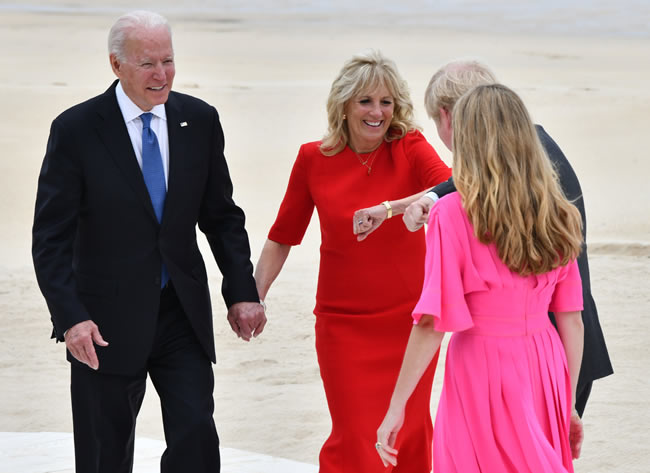
Photo: United Kingdom Prime Minister Boris Johnson and Carrie Symonds, United States of America President Joe Biden and Jill Biden pose for the official family picture at Carbis Bay hotel during the G7 Summit in Cornwall, UK, on the 11 June 2021. Image provided by & Copyright © Justin Goff/G7 Cornwall 2021.
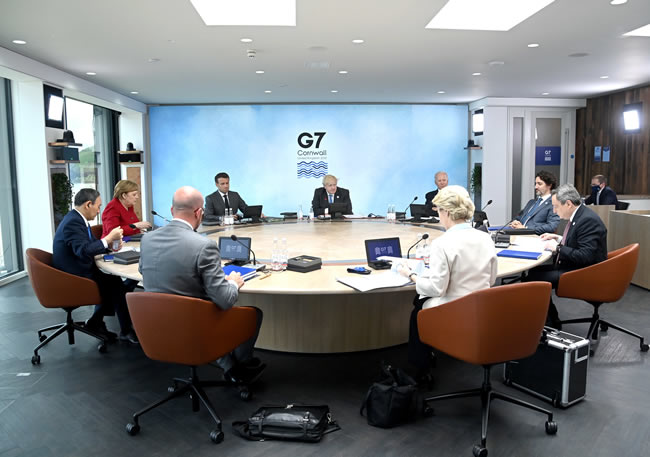
Photo: G7 Leaders Plenary Session at G7 Leaders’ Plenary Room, Carbis Bay, during the G7 Summit in Cornwall, UK, on 11 June 2021. Image provided by & Copyright © Karwai Tang/G7 Cornwall 2021.
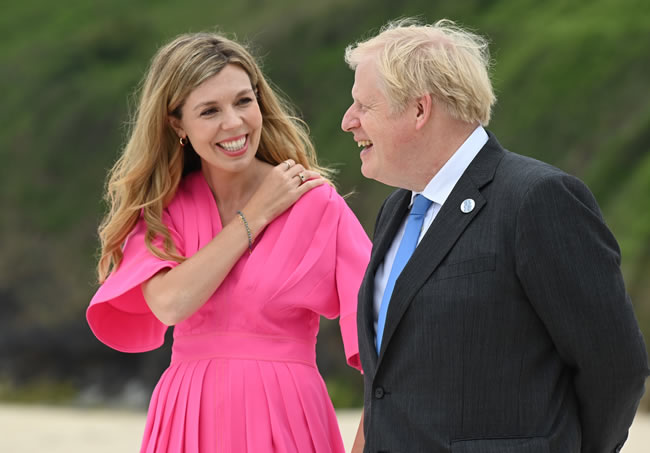
Photo: Boris Johnson and wife Carrie at Carbis Bay hotel during the G7 Summit in Cornwall, UK on 11 June 2021. Image provided by & Copyright © David Fisher/G7 Cornwall 2021.
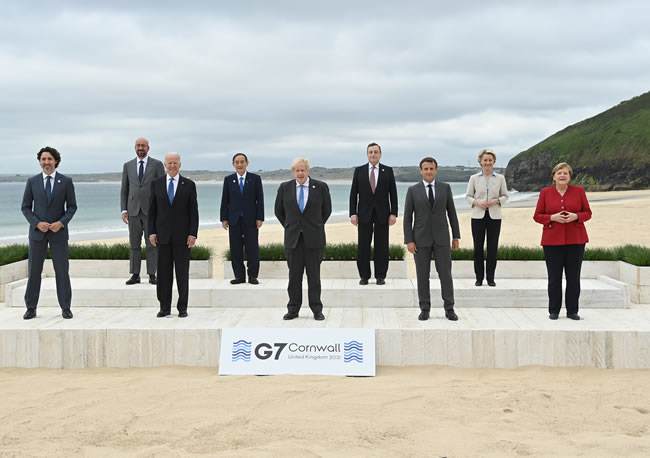
Photo: G7 Leaders’ Family Photo. (Back row L to R) EU Council President of the European Council Charles Michel, Japanese Prime Minister Yoshihide Suga, Italian Prime Minister Mario Draghi, EU Commission President Ursula von der Leyen, (Front row L to R) Canadian Prime Minister Justin Trudeau, United States of America President Joe Biden, United Kingdom Prime Minister Boris Johnson, French President Emmanuel Macron and German Chancellor Angela Merkel pose for the official family picture at Carbis Bay hotel during the G7 Summit in Cornwall, UK on 11 June 2021. Image provided by & Copyright © G7 Cornwall 2021.
• G7 Cornwall Summit — Summit Meeting Agenda
• Friday 11 June
Plenary Session One: Economic Recovery
G7 Leaders
Sarah Sands, Chair of the G7 Gender Equality Advisory Council, will address the G7 leaders.
• Saturday 12 June
Plenary Session Two: Global Resilience
G7 Leaders
Mark Sedwill, Chair of the G7 Economic Resilience Panel, will address the G7 Leaders.
Plenary Session Three: Foreign Policy
• G7 Leaders
Plenary Session Four: Health
G7 Leaders and Guests, plus International Organisations
Patrick Vallance, Chair of the International Pandemic Preparedness Partnership, and Melinda Gates, Co-Chair, and Founder of the Bill & Melinda Gates Foundation, will address the G7 Leaders and Guests.
• Sunday 13 June
Plenary Session Five: Open Societies
G7 Leaders and Guests, plus United Nations Secretary-General
Plenary Session Six: Climate and Nature
G7 Leaders and Guests, plus United Nations Secretary-General, plus International Organisations.
International Organisations participating virtually: International Monetary Fund, Organisation for Economic Co-operation and Development, World Bank Group, World Health Organisation, and World Trade Organisation.
Source: G7 UK 2021
|GlobalGiants.Com|
Edited & Posted by the Editor | 6:07 AM | View the original post


Photo: Times Square, 42nd Street 7th Avenue, New York, NY. Image Credit: Joe Nicholl.
NEW YORK, June 5, 2021 — On Saturday, June 5, New 42, a nonprofit organization focused on making performing arts a vital part of everyone’s life from the earliest years onward, celebrated arts educators in an outdoor celebration on 42nd Street in Times Square.
The event featured Sara Bareilles, Freestyle Love Supreme Academy, Bill Irwin, Dance Theatre of Harlem, Chop & Quench, Sahr Ngaujah, DJ Duane Harriott, Brooklyn United Marching Band, and Saxophone Ensemble of Celia Cruz Bronx High School of Music.
The event honored the New York City Department of Education, Office of Arts, and Special Projects. NYC Schools Chancellor Meisha Porter accepted the awards on their behalf. The event also honored Jody Gottfried Arnhold, a New York City public school teacher, a great supporter of dance and arts education. Presenters included Brian Stokes Mitchell, DeAngelo Blanchard, and Misty Copeland.
“Now more than ever, it’s important for us to celebrate the arts with a focus on arts educators, truly essential workers, who have continued to encourage and inspire children throughout the pandemic and beyond,” said Russell Granet, New 42 President & CEO.
New York City Mayor Bill de Blasio also made an appearance during the event and shared remarks about the importance of arts education for the very young. He congratulated the New York City Department of Education, Office of Arts, and Special Projects on being honored and noted that this honor extends to all teachers across the city.
“Building a recovery for all of us means reconnecting with the arts and cultural events that make New York City unique, and I’m proud to stand with and celebrate that recovery in the heart of Times Square,” said Mayor Bill de Blasio. “Today and every day, we’re grateful to all the educators who have engaged their students with uplifting, empowering, and healing artistic expression.”
“The arts have been a critical lifeline during this challenging year, providing students with outlets to express themselves and helping our school communities build resiliency,” said NYC Schools Chancellor Meisha Porter. “I’m grateful to our educators who have led with creativity and passion throughout this crisis, creating invaluable spaces for our children to chase their dreams.”
Several celebrities - including Renée Elise Goldsberry, Kal Penn, Neil deGrasse Tyson, John Leguizamo, Alison Pill, Michael James Scott, and New York Giants players Lorenzo Carter and Andrew Thomas - also participated virtually by sharing stories of their favorite teachers and the importance of arts education to them.
The June 5 event closed down traffic on West 42nd Street, filling the block between 7th and 8th Avenues with programming. Performances took place on the main stage in front of The New Victory Theater with event production provided by Empire Entertainment. At New 42 Studios, xRStage Times Square powered by WorldStage presented their innovative LED Stage & Studio designed for all types of live events and entertainment projects.
New 42 also announced New Victory Summer Programming, including the New Victory Dance summer series, a programming partnership with Little Island.
The New 42nd Street is a not-for-profit organization based in Manhattan, New York City. In 1990, New York City and State established it to oversee the redevelopment of seven historic theatres on 42nd Street between Seventh and Eighth Avenues and restore the block to a desirable tourist destination in Manhattan.
Its mission is to make extraordinary performing arts a vital part of everyone’s life in New York City. It connects people to world-class performances, essential education, employment programs, and creative communities that push culture forward. New 42 says it strives to serve artists, educators, and New Yorkers of all ages with invaluable arts engagement and resources in and beyond the performing arts.
Source: New 42
|GlobalGiants.Com|
Edited & Posted by the Editor | 1:19 PM | View the original post
• Due to the increase in Digital Entertainment, Content has become a commodity today, says Prof. Michael Young, President of New York Film Academy.
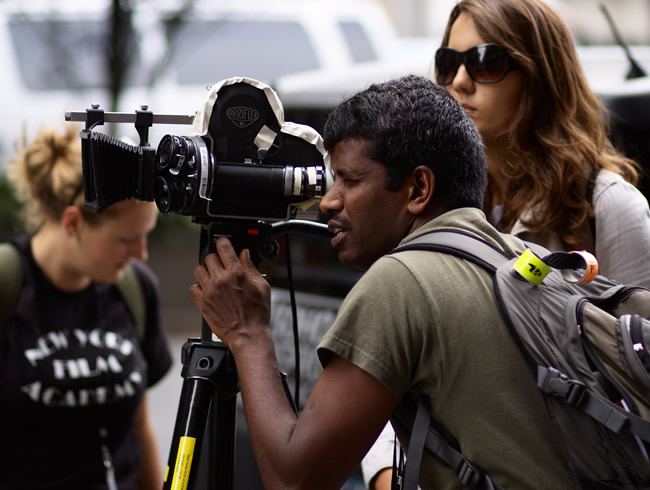
Photo: Learning Cinematography. New York, NY. Image Credit: Gwenael Piaser.
CHANDIGARH, India, June 5, 2021 — World’s leading and distinguished film school, New York Film Academy (NYFA), today signed an academic MoU with Chandigarh University. As a part of the agreement, Indian students can now pursue globally recognized Under-Graduate 3 years degree in Film Making from New York Film Academy by studying the first year of the program at Chandigarh University while studying the remaining two years at the New York Academy, USA.
The official MoU signing ceremony took place virtually today, where Mr. David Klein, Senior Executive, New York Film Academy, and the Pro-Chancellor, Chandigarh University, and other university officials exchanged the Memorandum of Understanding.
“NYFA is known for imparting hands-on practical learning to the students where they learn every minute aspect of film making. The students will undergo thousands of hours working and creating their content and projects under the guidance of renowned filmmakers, technicians, and experts from Hollywood,” said Prof. Michael Young, President of New York Film Academy. “We introduce the students to various career options in Filmmaking such as Direction, Script Writing, Sound Engineering, Visual Effects, Animation, Camera Handling, Lights and Camera Set-up. They are required to work as a team on small projects,” Prof. Young added.
Prof. Michael Young further said, “Eminent Hollywood directors like Steven Spielberg, Ron Howard, Mira Nair, Doung Liman are some of the prominent guest faculty that the students who are joining the program would be interacting. The students would have the chance to work with them during their academic learning.” Professor Young explained that the students would learn and work on the latest technology and tools in the International film industry to become experienced and ready when they move out of university and start their careers. He further said, “With digital platforms such as OTT, Social Media taking the lead, the content has become a commodity, and the students have to understand the art of developing quality content which is recognized and appreciated by the global audience.”
The Pro-Chancellor, Chandigarh University, said, “This year, most Indian students might not be able to travel abroad to study due to the prevalent COVID-19 pandemic situation. We at Chandigarh University offer a unique opportunity to the students in India through our International Articulation programs. The students get the global academic learning experience by studying for one or two years in India and then moving to respective Universities in the USA, Australia, and the UK to complete their degree programs. By then the situation will improve for traveling. The other important aspects of the International Articulation Programs are that the students save precious academic years and education costs. During the initial years of the academic program, the student would pay fees per Indian fee structure and also in Indian Currency which saves at least 33% cost incurred in comparison if you pursue the full degree abroad.”
Source: Chandigarh Educational Trust
|GlobalGiants.Com|
Edited & Posted by the Editor | 2:10 PM | View the original post
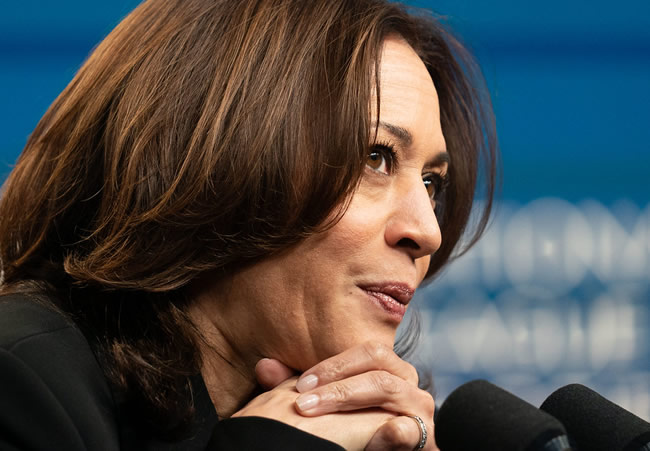
Photo: U.S. Vice President Kamala Harris delivers remarks to the National League of Cities via video conference from the South Court Auditorium of the Eisenhower Executive Office Building at the White House. (Official White House Photo by Lawrence Jackson).
• Statement by Senior Advisor and Chief Spokesperson Symone Sanders on Vice President Kamala Harris’s Calls with Foreign Leaders on the Global Allocation Plan for the First 25 Million Doses of COVID-19 Vaccines.
JUNE 03, 2021
Vice President Kamala D. Harris spoke this morning to President Andres Manuel López Obrador of Mexico, President Alejandro Giammattei of Guatemala, Prime Minister Narendra Modi of India, and Prime Minister Keith Rowley, Chairman of the Caribbean Community (CARICOM). In four separate calls, the Vice President notified each of the leaders that the Biden-Harris Administration would begin sharing the first 25 million doses of COVID vaccines to their respective countries and others. It is a part of the Biden-Harris Administration’s framework for dispatching at least 80 million vaccines globally by the end of June.
The Vice President reiterated that the Administration’s efforts are focused on achieving broad global coverage, responding to surges and other urgent situations and public health needs, and helping as many countries as possible who requested vaccines. The four leaders thanked the Vice President, and they agreed to continue working together to address COVID-19 and advance our mutual interests around the world.
Source: The White House Briefing Room
|GlobalGiants.Com|
Edited & Posted by the Editor | 11:40 AM | View the original post
Heads of International Monetary Fund (IMF), World Bank Group (WB), World Health Organization (WHO), and World Trade Organization (WTO) issue extraordinary calls for financing actions by government leaders to accelerate an end to the COVID-19 pandemic.
IMF, WB, WHO, and WTO chiefs call for US$50 billion investment to generate US$9 trillion in global economic returns by 2025 and boost manufacturing capacity, supply, trade flows, and the equitable distribution of diagnostics, oxygen, treatments, medical supplies, and vaccines.
The call to action by this quadrilateral grouping comes at a dangerous point in the pandemic. As the historic World Health Assembly concludes, G7 meetings commence and follow the G20 Global Health Summit.
Doses need to be donated immediately to developing countries, synchronized with national vaccine deployment plans, including through COVAX, co-led by CEPI, Gavi, and WHO, alongside key delivery partner UNICEF.
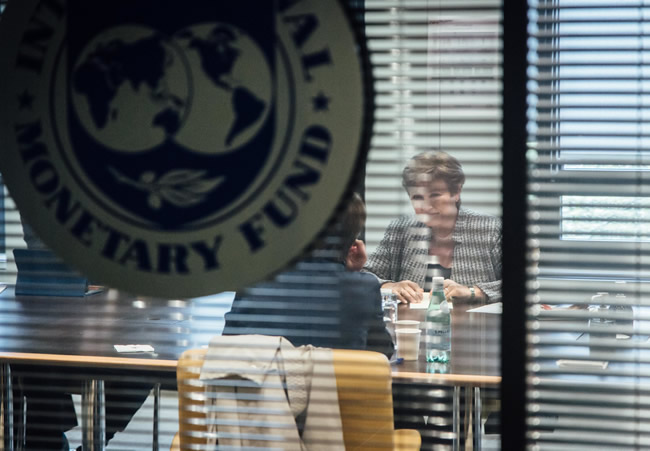
Photo: International Monetary Fund Managing Director Kristalina Georgieva meets with Odile Renaud-Basso, President of the European Bank for Reconstruction and Development (EBRD), at the IMF Paris Office. May 17, 2021. Paris, France. IMF Photo/Cyril Marcilhacy.
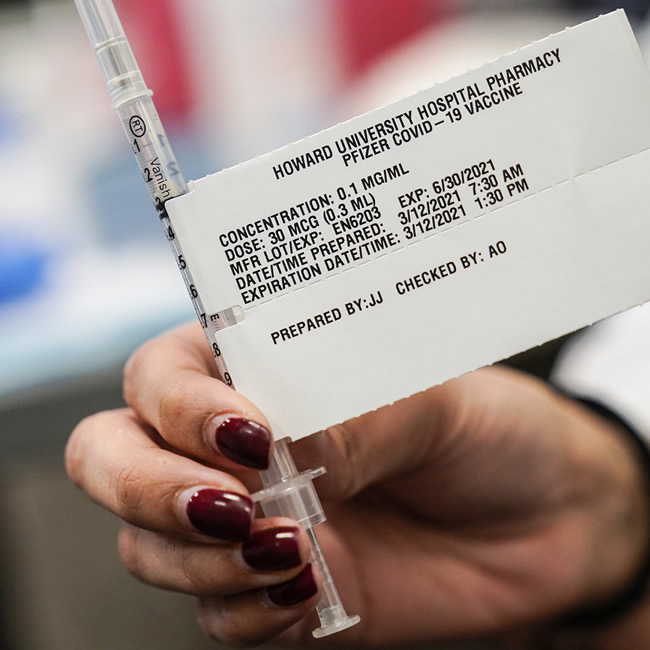
Photo: A doctor holds a syringe containing the Pfizer COVID-19 vaccine at Howard University Hospital. March 12, 2021. Washington, DC, United States. IMF Photo/Joshua Roberts.
Geneva/Washington, DC, June 1, 2021 — The heads of the world’s predominant global financing, health and trade agencies have united in urging government leaders to urgently finance a new US$50 billion roadmap to accelerate the equitable distribution of health tools. It would help end the pandemic that has devastated lives and livelihoods for 18 months. It would also set the foundations for a genuinely global recovery, as well as enhanced health security.
The leaders of the International Monetary Fund, World Bank Group, World Health Organization, and World Trade Organization [Kristalina Georgieva, Tedros Adhanom Ghebreyesus, David Malpass, and Ngozi Okonjo-Iweala] have issued a joint statement. They say the governments must act without further delay or risk continued waves and explosive outbreaks of COVID-19 and more transmissible and deadly virus variants undermining the global recovery.
Leaders of the four agencies said: “By now, it has become abundantly clear there will be no broad-based recovery without an end to the health crisis. Access to vaccination is key to both.”
The joint statement draws on a recent IMF staff analysis, which stated that US$50 billion in new investment is needed to increase manufacturing capacity, supply, trade flows, and delivery, which would accelerate the equitable distribution of diagnostics, oxygen, treatments, medical supplies, and vaccines. This injection would also give a significant boost to economic growth around the world.
“At an estimated US$50 billion, it will bring the pandemic to an end faster in the developing world, reduce infections and loss of lives, accelerate the economic recovery, and generate some US$9 trillion in additional global output by 2025, “said the leaders.
It echoes economic analysis by the International Chamber of Commerce and the Eurasia Group - both of which make a case for a relatively modest investment by governments compared to the trillions spent on national stimulus plans and lost trillions in foregone economic output. But the critical element of this is that it effectively spurs global vaccination and bridges the equity gap.
“Increasing our ambition and vaccinating more people faster: WHO and its COVAX partners have set a goal of vaccinating approximately 30% of the population in all countries by the end of 2021,” said the four leaders. “But this can reach even 40% through other agreements and surge investment, and at least 60 percent by the first half of 2022.”
The leaders have urged the governments to act on the investment opportunity to boost vaccines, oxygen, tests, and treatment supplies. The IMF, WBG, WHO, and WTO chiefs issued their joint statement as the World Health Assembly drew to a conclusion.
“To urgently get more shots in arms, doses need to be donated immediately to developing countries synchronized with national vaccine deployment plans, including through COVAX,” said the four leaders. “Cooperation on trade is also needed to ensure free cross-border flows and increasing supplies of raw materials and finished vaccines.”
The IMF, WBG, WHO, and WTO leaders would address a joint press conference later today to outline the new joint roadmap to ending the pandemic and driving the genuinely global and fast recovery.
Sources: IMF, WHO, WB, WTO
|GlobalGiants.Com|
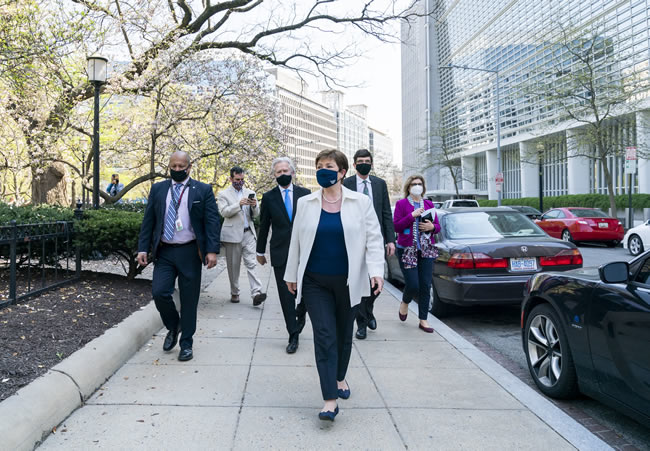
Photo: International Monetary Fund Managing Director Kristalina Georgieva walks back to IMF HQ following her interview with the BBC’s Katty Kay. April 7, 2021. Washington, DC, United States. IMF Photo/Cory Hancock.
• Following is the Joint Statement by Kristalina Georgieva, Tedros Adhanom Ghebreyesus, David Malpass, and Ngozi Okonjo-Iweala:
• A NEW COMMITMENT FOR VACCINE EQUITY AND DEFEATING THE PANDEMIC •
As preparations are made for the G7 Summit in the United Kingdom of Great Britain and Northern Ireland next week, the top of the agenda is how to end the COVID-19 pandemic and secure the global recovery. Urgent challenges face us.
By now, it has become abundantly clear there will be no broad-based recovery without an end to the health crisis. Access to vaccination is key to both.
There has been impressive progress on the vaccination front. Scientists have come up with multiple vaccines in record time. Unprecedented public and private financing have supported vaccine research, development, and manufacturing scale-up. But a dangerous gap between richer and poorer nations persists.
Even as some affluent countries are already discussing the rollout of booster shots to their populations, the vast majority of people in developing countries — even front-line health workers — have still not received their first shot. The worst served are low-income nations which have received less than one percent of vaccines administered so far.
Increasingly, a two-track pandemic is developing, with richer countries having access and poorer ones left behind.
Inequitable vaccine distribution is not only leaving untold millions of people vulnerable to the virus. It is also allowing deadly variants to emerge and rebound back across the world. As variants continue to spread, even countries with advanced vaccination programs reimpose stricter public health measures, and some have implemented travel restrictions. In turn, the ongoing pandemic is leading to deepening divergence in economic fortunes, with negative consequences for all.
It need not be this way. That is why we are calling today for a new level of international support for - and implementation of - a stepped-up coordinated strategy, backed by new financing, to vaccinate the world.
A recent proposal from the International Monetary Fund (IMF) staff put forward a plan with clear targets, practical actions, and a feasible cost. It builds on and supports the ongoing work of WHO, its partners in the Access to COVID-19 Tools (ACT) Accelerator initiative and its global vaccine access program COVAX and the result of the World Bank Group, the World Trade Organization (WTO), and many others.
At an estimated $50 billion, it will bring the pandemic to an end faster in the developing world, reduce infections and loss of lives, accelerate the economic recovery, and generate some $9 trillion in additional global output by 2025. It is a win for all — while around 60 percent of the gains will go to emerging markets and developing economies, the remaining 40 percent will benefit the developed world. And this is without taking into account the invaluable benefits on people’s health and lives.
• What does it entail?
First. Increasing our ambition and vaccinating more people faster: WHO and its COVAX partners have set a goal of vaccinating approximately 30% of the population in all countries by the end of 2021. But this can reach even 40% through other agreements and surge investment, and at least 60 percent by the first half of 2022.
To do so requires additional financing for low- and middle-income countries, with a very significant proportion in the form of grants and concessional funding. To urgently get more shots in arms, we must immediately donate doses to developing countries synchronized with national vaccine deployment plans, including through COVAX. Cooperation on trade is also needed to ensure free cross-border flows and increase raw materials and finished vaccines.
Second. Insurance against downside risks such as new variants that may necessitate booster shots. It means investing in additional vaccine production capacity by at least one billion doses, diversifying production to regions with little current power, sharing technology and know-how, scaling up genomic and supply-chain surveillance, and contingency plans to handle virus mutations or supply shocks.
We must remove all blockages to expanding supply, and we call on WTO members to accelerate negotiations towards a pragmatic solution around intellectual property. Several low- and middle-income countries are also making moves to invest in their local manufacturing capacity, which is crucial to end this pandemic and prepare for the next one.
Third. Immediate boosting of testing and tracing, oxygen supplies, therapeutic and public health measures, ramping up vaccine deployment, and the ACT-Accelerator initiative. WHO, UNICEF, the World Bank, and Gavi have been conducting vaccine readiness assessments in over 140 developing countries and providing on-the-ground support and financing to prepare for vaccine rollout.
• What about the cost?
Of the US$ 50 billion, there is a strong case for grants of at least US$ 35 billion. G20 governments have sent positive signals, recognizing the importance of providing about US$ 22 billion in additional funding for 2021 to the ACT-Accelerator.
Additional financing of about US$ 13 billion is needed to boost vaccine supply in 2022 and further scale up testing, therapeutics, and surveillance. The remainder of the overall financing plan — around US$15 billion — could come from national governments supported by multilateral development banks, including the World Bank’s US$12 billion financial facilities for vaccination.
For the plan to work, there are two additional requirements: speed and coordination.
It calls for upfront financing, upfront vaccine donations, and upfront precautionary investments and planning - rather than commitments that may be slow to materialize. All of this must be made available as soon as possible.
It also requires coordinated global action, grounded in complete transparency in the procurement and delivery process. The strategy’s success depends on all parties—public, private, international financial institutions, foundations — moving in tandem.
Investing US$ 50 billion to end the pandemic is potentially the best use of public money we will see in our lifetimes. It will pay a colossal development dividend and boost growth and well-being globally. But the window of opportunity is closing fast — the longer we wait, the costlier it becomes, in the human suffering and economic losses.
Today, on behalf of our four organizations, we announce a new commitment to work together to scale up needed financing, boost manufacturing, and ensure the smooth flow of vaccines and raw materials across borders. It would dramatically increase vaccine access to support the health response and economic recovery and bring needed hope.
Our institutions are stepping up to turn this hope into reality:
The IMF is preparing an unprecedented Special Drawing Rights (SDR) allocation to boost the reserves and liquidity of its members. WHO is seeking to identify financing so that the urgent needs of its Strategic Preparedness and Response Plan and the ACT-Accelerator partnership can be met, with COVID-19 Technology Access Pool (C-TAP) incentivizing the sharing of know-how and technology. The World Bank will have vaccine projects up and running in at least 50 countries by mid-year—with the International Finance Corporation working to mobilize the private sector to boost vaccine supply for developing countries. And the WTO is working on freeing up supply chains for the plan to succeed.
Ending the pandemic is a solvable problem that requires global action—now.
Let’s all pull together and get the job done.
— Kristalina Georgieva is the Managing Director of the International Monetary Fund (IMF); Tedros Adhanom Ghebreyesus is the Director-General of the World Health Organization (WHO); David Malpass is the President of the World Bank Group; Ngozi Okonjo-Iweala is the Director-General of the World Trade Organization (WTO).
Edited & Posted by the Editor | 1:41 AM | View the original post
 |
 |
